
ChatData
ChatData 🔍 📖 brings RAG to real applications with FREE✨ knowledge bases. Now enjoy your chat with 6 million wikipedia pages and 2 million arxiv papers.
Stars: 135
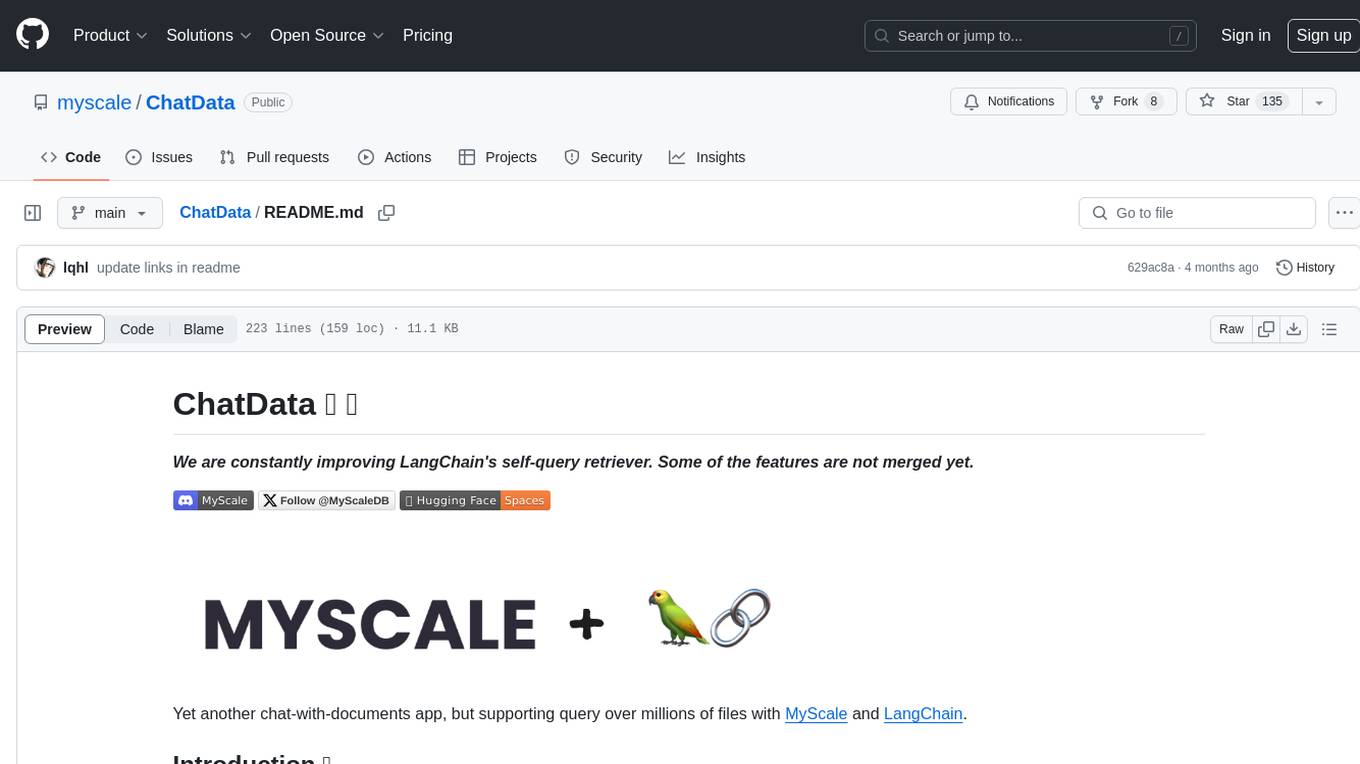
ChatData is a robust chat-with-documents application designed to extract information and provide answers by querying the MyScale free knowledge base or uploaded documents. It leverages the Retrieval Augmented Generation (RAG) framework, millions of Wikipedia pages, and arXiv papers. Features include self-querying retriever, VectorSQL, session management, and building a personalized knowledge base. Users can effortlessly navigate vast data, explore academic papers, and research documents. ChatData empowers researchers, students, and knowledge enthusiasts to unlock the true potential of information retrieval.
README:
We are constantly improving LangChain's self-query retriever. Some of the features are not merged yet.
Yet another chat-with-documents app, but supporting query over millions of files with MyScale and LangChain.
ChatData is a robust chat-with-documents application designed to extract information and provide answers by querying the MyScale free knowledge base or your uploaded documents.
Powered by the Retrieval Augmented Generation (RAG) framework, ChatData leverages millions of Wikipedia pages and arXiv papers as its external knowledge base, with MyScale managing all data hosting tasks. Simply input your questions in natural language, and ChatData takes care of generating SQL, querying the data, and presenting the results.
Enhancing your chat experience, ChatData introduces three key features. Let's delve into each of them in detail.
MyScale works closely with LangChain, providing the easiest interface to build complex queries with LLM.
Self-querying retriever: MyScale augmented LangChain's Self Querying Retriever, where the LLM can use more data types, for instance timestamps and array of strings, to build filters for the query.
VectorSQL: SQL is powerful and can be used to construct complex search queries. Vector Structured Query Language (Vector SQL) is designed to teach LLMs how to query SQL vector databases. Besides the general data types and functions, vectorSQL contains extra functions like DISTANCE(column, query_vector)and NeuralArray(entity), with which we can extend the standard SQL for vector search.
To enhance your experience and seamlessly continue interactions with existing sessions, ChatData has introduced the Session Management feature. You can easily customize your session ID and modify your prompt to guide ChatData in addressing your queries. With just a few clicks, you can enjoy smooth and personalized session interactions.
In addition to tapping into ChatData's external knowledge base powered by MyScale for answers, you also have the option to upload your own files and establish a personalized knowledge base. We've implemented the Unstructured API for this purpose, ensuring that only processed texts from your documents are stored, prioritizing your data privacy.
In conclusion, with ChatData, you can effortlessly navigate through vast amounts of data, effortlessly accessing precisely what you need. Whether you're a researcher, a student, or a knowledge enthusiast, ChatData empowers you to explore academic papers and research documents like never before. Unlock the true potential of information retrieval with ChatData and discover a world of knowledge at your fingertips.
➡️ Dive in and experience ChatData on Hugging Face🤗
Database credentials:
MYSCALE_HOST = "msc-4a9e710a.us-east-1.aws.staging.myscale.cloud"
MYSCALE_PORT = 443
MYSCALE_USER = "chatdata"
MYSCALE_PASSWORD = "myscale_rocks"ChatData also provides you access to Wikipedia, a large knowledge base that contains about 36 million paragraphs under 5 million wiki pages. The knowledge base is a snapshot on 2022-12.
You can query from this table with the public account here.
CREATE TABLE wiki.Wikipedia (
-- Record ID
`id` String,
-- Page title to this paragraph
`title` String,
-- Paragraph text
`text` String,
-- Page URL
`url` String,
-- Wiki page ID
`wiki_id` UInt64,
-- View statistics
`views` Float32,
-- Paragraph ID
`paragraph_id` UInt64,
-- Language ID
`langs` UInt32,
-- Feature vector to this paragraph
`emb` Array(Float32),
-- Vector Index
VECTOR INDEX emb_idx emb TYPE MSTG('metric_type=Cosine'),
CONSTRAINT emb_len CHECK length(emb) = 768)
ENGINE = ReplacingMergeTree ORDER BY id SETTINGS index_granularity = 8192ChatData brings millions of papers into your knowledge base. We imported 2.2 million papers with metadata info, which contains:
-
id: paper's arxiv id -
abstract: paper's abstracts used as ranking criterion (with InstructXL) -
vector: column that contains the vector array inArray(Float32) -
metadata: LangChain VectorStore Compatible Columns-
metadata.authors: paper's authors in list of strings -
metadata.abstract: paper's abstracts used as ranking criterion (with InstructXL) -
metadata.titles: papers's titles -
metadata.categories: paper's categories in list of strings like ["cs.CV"] -
metadata.pubdate: paper's date of publication in ISO 8601 formated strings -
metadata.primary_category: paper's primary category in strings defined by arXiv -
metadata.comment: some additional comment to the paper
-
Columns below are native columns in MyScale and can only be used as SQLDatabase
-
authors: paper's authors in list of strings -
titles: papers's titles -
categories: paper's categories in list of strings like ["cs.CV"] -
pubdate: paper's date of publication in Date32 data type (faster) -
primary_category: paper's primary category in strings defined by arXiv -
comment: some additional comment to the paper
And for overall table schema, please refer to table creation section in docs/self-query.md.
If you want to use this database with langchain.chains.sql_database.base.SQLDatabaseChain or langchain.retrievers.SQLDatabaseRetriever, please follow guides on data preparation section and chain creation section in docs/vector-sql.md
python3 -m pip install requirements.txt
python3 -m streamlit run app.py-
Or Directly use MyScale database as service... for FREE ✨
import clickhouse_connect client = clickhouse_connect.get_client( host='msc-4a9e710a.us-east-1.aws.staging.myscale.cloud', port=443, username='chatdata', password='myscale_rocks' )
- 🚀 Upload your documents and chat with your own knowledge bases with MyScale!
- 💬 Chat with RAG-enabled agents on both ArXiv and Wikipedia knowledge base!
- 📖 Wikipedia is available as knowledge base!! Feel FREE 💰 to ask with 36 million of paragraphs under 5 million titles! 💫
- 🤖 LLMs are now capable of writing Vector SQL - a extended SQL with vector search! Vector SQL allows you to access MyScale faster and stronger! This will be added to LangChain soon! (PR 7454)
- 🌏 Customized Retrieval QA Chain that gives you more information on each PDF and answer question in your native language!
- 🔧 Our contribution to LangChain that helps self-query retrievers filter with more types and functions
- 🌟 We just opened a FREE pod hosting data for ArXiv paper. Anyone can try their own SQL with vector search!!! Feel the power when SQL meets vector search! See how to access the pod here.
- 📚 We collected about 2 million papers on arxiv! We are collecting more and we need your advice!
- More coming...
- Enter directory
app/
cd app/- Create an virtual environment
python3 -m venv .venv
source .venv/bin/activate- Install dependencies
This app is currently using MyScale's technical preview of LangChain.
It contains improved SQLDatabaseChain in this PR
It contains improved prompts for comparators
LIKEandCONTAINin MyScale self-query retriever.
python3 -m pip install -r requirements.txt- Run the app!
# fill you OpenAI key in .streamlit/secrets.toml
cp .streamlit/secrets.example.toml .streamlit/secrets.toml
# start the app
python3 -m streamlit run app.py- Why Vector SQL?
- How did LangChain and MyScale convert natural language to structured filters?
- How to make chain execution more responsive in LangChain?
- How this app is built?
- What is the overview pipeline?
- How did LangChain and MyScale convert natural language to structured filters?
- How to make chain execution more responsive in LangChain?
- Welcome to join our #ChatData channel in Discord to discuss anything about ChatData.
- Feel free to filing an issue or opening a PR against this repository.
- arXiv API for its open access interoperability to pre-printed papers.
- InstructorXL for its promptable embeddings that improves retrieve performance.
- LangChain🦜️🔗 for its easy-to-use and composable API designs and prompts.
- OpenChatPaper for prompt design reference.
- The Alexandria Index for providing arXiv data index to the public.
For Tasks:
Click tags to check more tools for each tasksFor Jobs:
Alternative AI tools for ChatData
Similar Open Source Tools

ChatData
ChatData is a robust chat-with-documents application designed to extract information and provide answers by querying the MyScale free knowledge base or uploaded documents. It leverages the Retrieval Augmented Generation (RAG) framework, millions of Wikipedia pages, and arXiv papers. Features include self-querying retriever, VectorSQL, session management, and building a personalized knowledge base. Users can effortlessly navigate vast data, explore academic papers, and research documents. ChatData empowers researchers, students, and knowledge enthusiasts to unlock the true potential of information retrieval.

honcho
Honcho is a platform for creating personalized AI agents and LLM powered applications for end users. The repository is a monorepo containing the server/API for managing database interactions and storing application state, along with a Python SDK. It utilizes FastAPI for user context management and Poetry for dependency management. The API can be run using Docker or manually by setting environment variables. The client SDK can be installed using pip or Poetry. The project is open source and welcomes contributions, following a fork and PR workflow. Honcho is licensed under the AGPL-3.0 License.
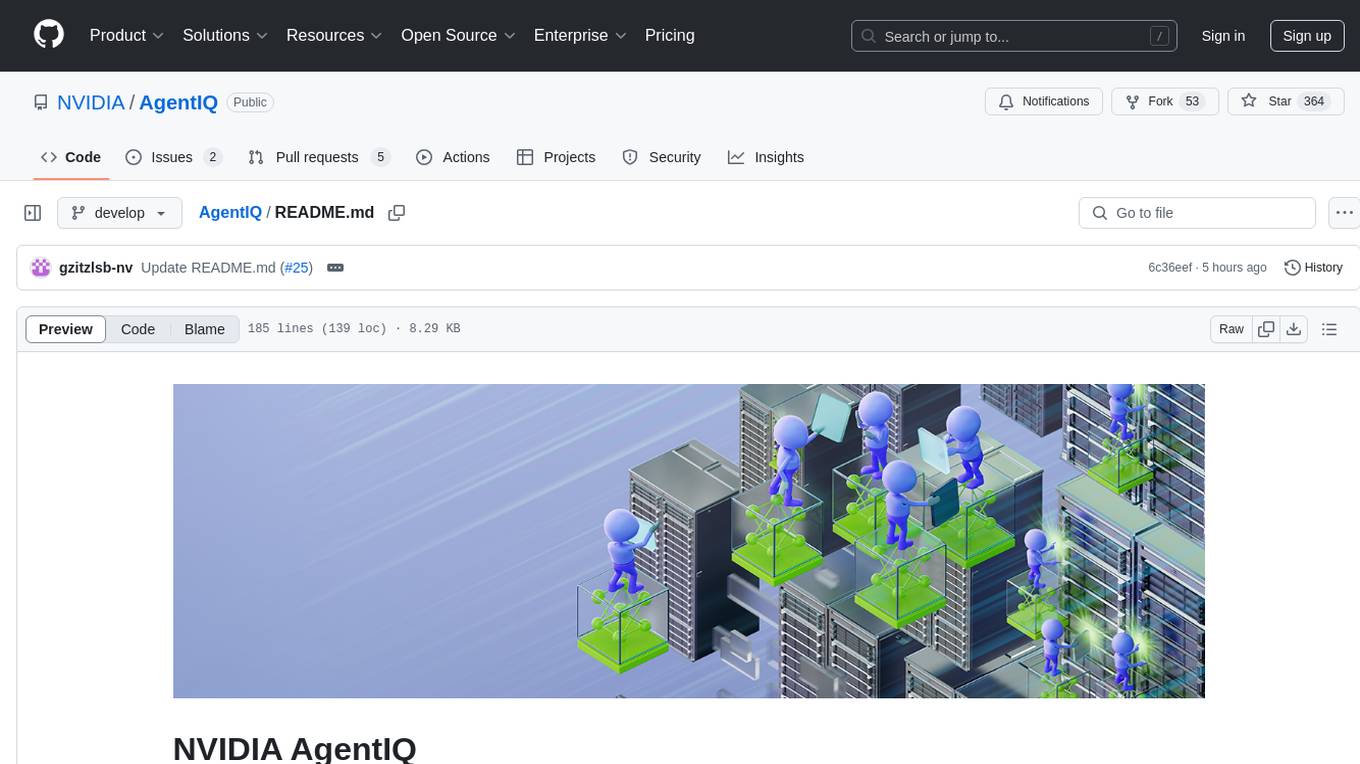
AgentIQ
AgentIQ is a flexible library designed to seamlessly integrate enterprise agents with various data sources and tools. It enables true composability by treating agents, tools, and workflows as simple function calls. With features like framework agnosticism, reusability, rapid development, profiling, observability, evaluation system, user interface, and MCP compatibility, AgentIQ empowers developers to move quickly, experiment freely, and ensure reliability across agent-driven projects.
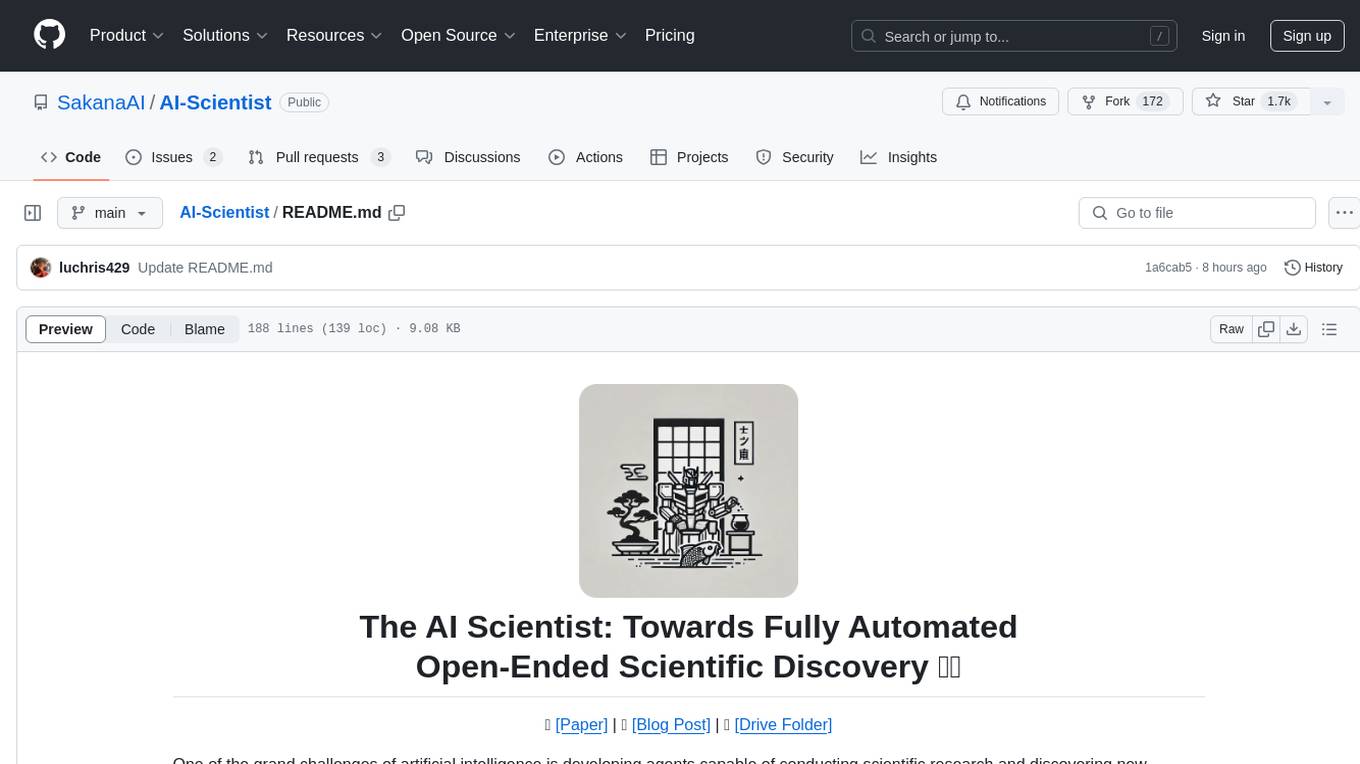
AI-Scientist
The AI Scientist is a comprehensive system for fully automatic scientific discovery, enabling Foundation Models to perform research independently. It aims to tackle the grand challenge of developing agents capable of conducting scientific research and discovering new knowledge. The tool generates papers on various topics using Large Language Models (LLMs) and provides a platform for exploring new research ideas. Users can create their own templates for specific areas of study and run experiments to generate papers. However, caution is advised as the codebase executes LLM-written code, which may pose risks such as the use of potentially dangerous packages and web access.

telemetry-airflow
This repository codifies the Airflow cluster that is deployed at workflow.telemetry.mozilla.org (behind SSO) and commonly referred to as "WTMO" or simply "Airflow". Some links relevant to users and developers of WTMO: * The `dags` directory in this repository contains some custom DAG definitions * Many of the DAGs registered with WTMO don't live in this repository, but are instead generated from ETL task definitions in bigquery-etl * The Data SRE team maintains a WTMO Developer Guide (behind SSO)
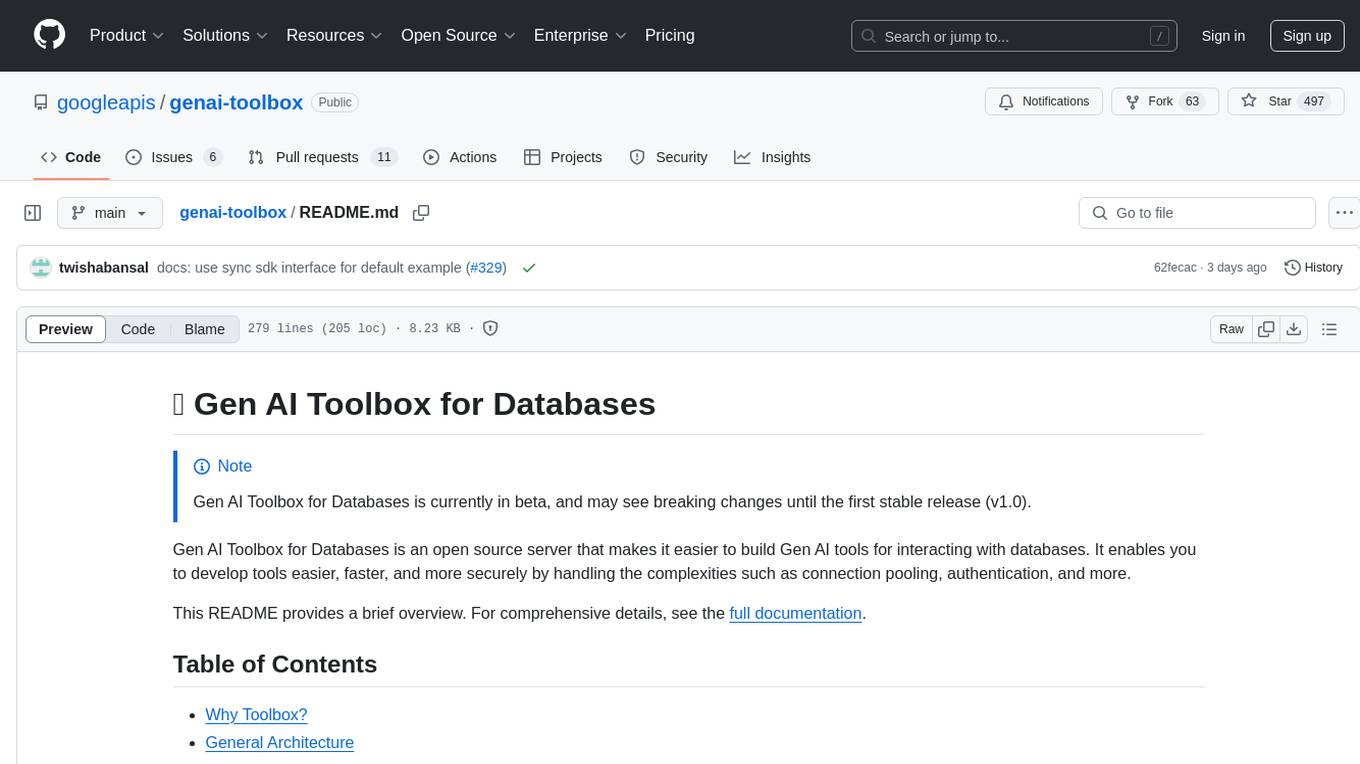
genai-toolbox
Gen AI Toolbox for Databases is an open source server that simplifies building Gen AI tools for interacting with databases. It handles complexities like connection pooling, authentication, and more, enabling easier, faster, and more secure tool development. The toolbox sits between the application's orchestration framework and the database, providing a control plane to modify, distribute, or invoke tools. It offers simplified development, better performance, enhanced security, and end-to-end observability. Users can install the toolbox as a binary, container image, or compile from source. Configuration is done through a 'tools.yaml' file, defining sources, tools, and toolsets. The project follows semantic versioning and welcomes contributions.

cognita
Cognita is an open-source framework to organize your RAG codebase along with a frontend to play around with different RAG customizations. It provides a simple way to organize your codebase so that it becomes easy to test it locally while also being able to deploy it in a production ready environment. The key issues that arise while productionizing RAG system from a Jupyter Notebook are: 1. **Chunking and Embedding Job** : The chunking and embedding code usually needs to be abstracted out and deployed as a job. Sometimes the job will need to run on a schedule or be trigerred via an event to keep the data updated. 2. **Query Service** : The code that generates the answer from the query needs to be wrapped up in a api server like FastAPI and should be deployed as a service. This service should be able to handle multiple queries at the same time and also autoscale with higher traffic. 3. **LLM / Embedding Model Deployment** : Often times, if we are using open-source models, we load the model in the Jupyter notebook. This will need to be hosted as a separate service in production and model will need to be called as an API. 4. **Vector DB deployment** : Most testing happens on vector DBs in memory or on disk. However, in production, the DBs need to be deployed in a more scalable and reliable way. Cognita makes it really easy to customize and experiment everything about a RAG system and still be able to deploy it in a good way. It also ships with a UI that makes it easier to try out different RAG configurations and see the results in real time. You can use it locally or with/without using any Truefoundry components. However, using Truefoundry components makes it easier to test different models and deploy the system in a scalable way. Cognita allows you to host multiple RAG systems using one app. ### Advantages of using Cognita are: 1. A central reusable repository of parsers, loaders, embedders and retrievers. 2. Ability for non-technical users to play with UI - Upload documents and perform QnA using modules built by the development team. 3. Fully API driven - which allows integration with other systems. > If you use Cognita with Truefoundry AI Gateway, you can get logging, metrics and feedback mechanism for your user queries. ### Features: 1. Support for multiple document retrievers that use `Similarity Search`, `Query Decompostion`, `Document Reranking`, etc 2. Support for SOTA OpenSource embeddings and reranking from `mixedbread-ai` 3. Support for using LLMs using `Ollama` 4. Support for incremental indexing that ingests entire documents in batches (reduces compute burden), keeps track of already indexed documents and prevents re-indexing of those docs.
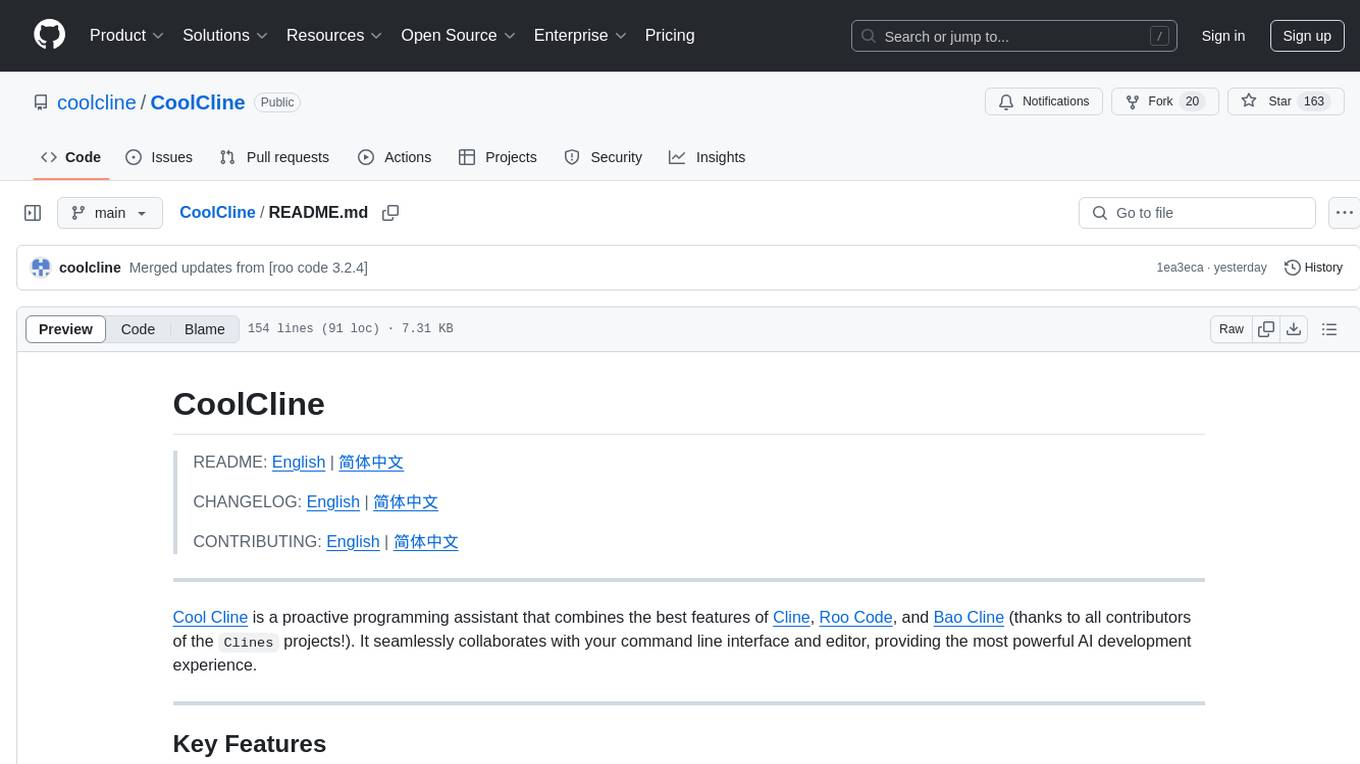
CoolCline
CoolCline is a proactive programming assistant that combines the best features of Cline, Roo Code, and Bao Cline. It seamlessly collaborates with your command line interface and editor, providing the most powerful AI development experience. It optimizes queries, allows quick switching of LLM Providers, and offers auto-approve options for actions. Users can configure LLM Providers, select different chat modes, perform file and editor operations, integrate with the command line, automate browser tasks, and extend capabilities through the Model Context Protocol (MCP). Context mentions help provide explicit context, and installation is easy through the editor's extension panel or by dragging and dropping the `.vsix` file. Local setup and development instructions are available for contributors.

deepeval
DeepEval is a simple-to-use, open-source LLM evaluation framework specialized for unit testing LLM outputs. It incorporates various metrics such as G-Eval, hallucination, answer relevancy, RAGAS, etc., and runs locally on your machine for evaluation. It provides a wide range of ready-to-use evaluation metrics, allows for creating custom metrics, integrates with any CI/CD environment, and enables benchmarking LLMs on popular benchmarks. DeepEval is designed for evaluating RAG and fine-tuning applications, helping users optimize hyperparameters, prevent prompt drifting, and transition from OpenAI to hosting their own Llama2 with confidence.
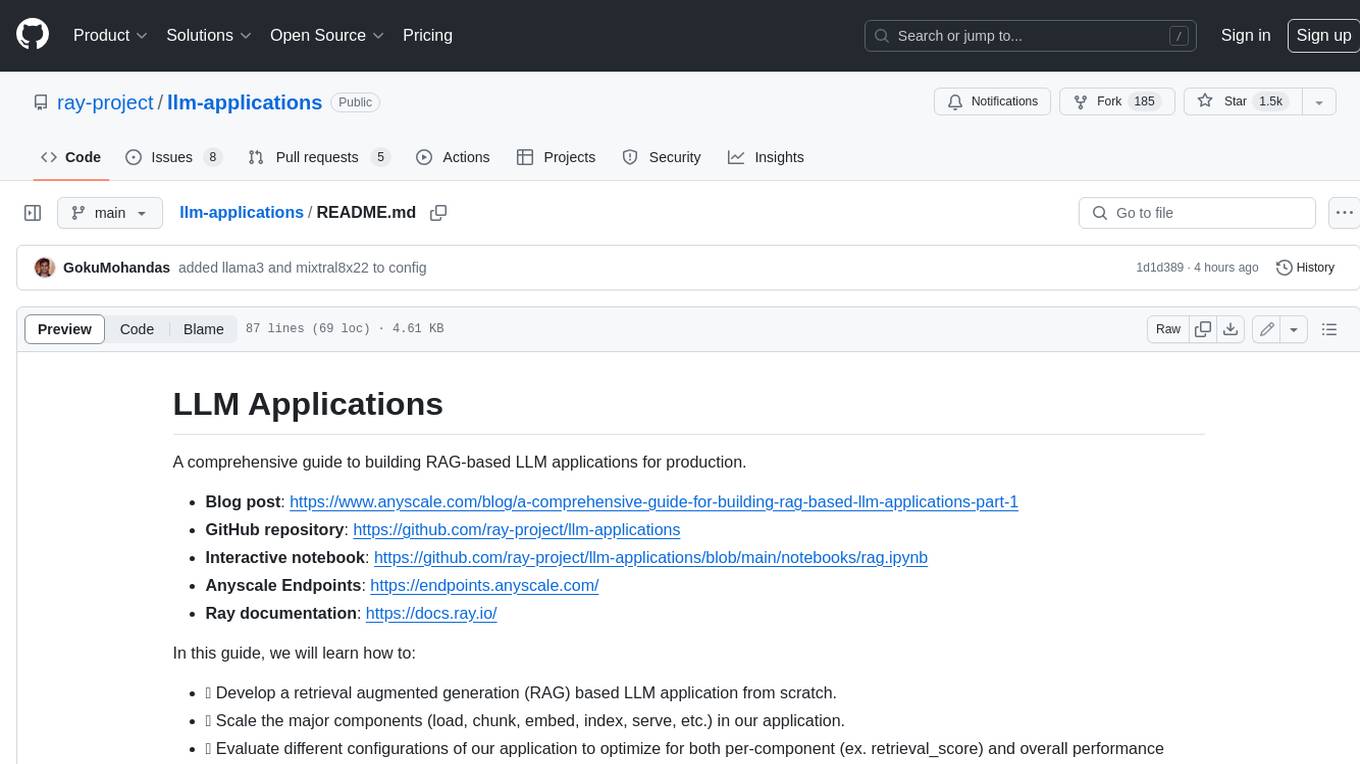
llm-applications
A comprehensive guide to building Retrieval Augmented Generation (RAG)-based LLM applications for production. This guide covers developing a RAG-based LLM application from scratch, scaling the major components, evaluating different configurations, implementing LLM hybrid routing, serving the application in a highly scalable and available manner, and sharing the impacts LLM applications have had on products.
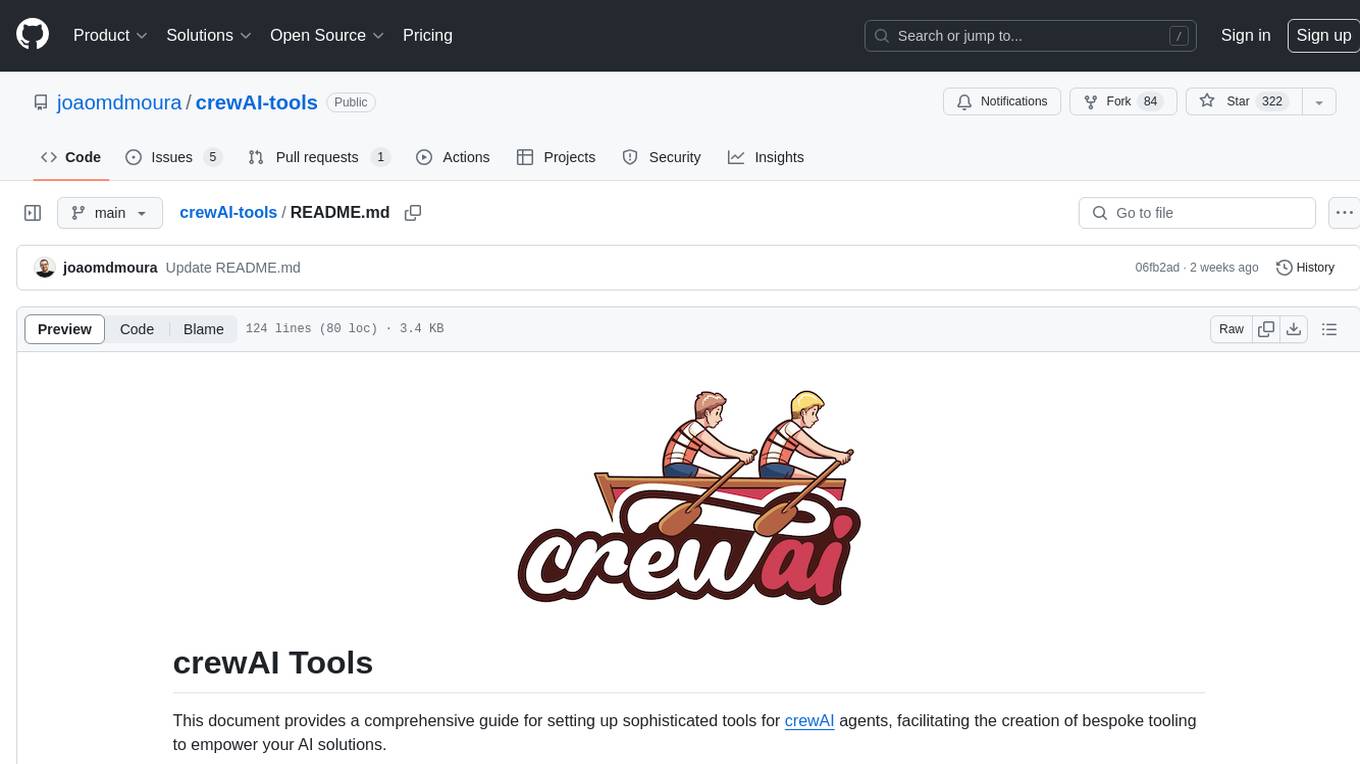
crewAI-tools
The crewAI Tools repository provides a guide for setting up tools for crewAI agents, enabling the creation of custom tools to enhance AI solutions. Tools play a crucial role in improving agent functionality. The guide explains how to equip agents with a range of tools and how to create new tools. Tools are designed to return strings for generating responses. There are two main methods for creating tools: subclassing BaseTool and using the tool decorator. Contributions to the toolset are encouraged, and the development setup includes steps for installing dependencies, activating the virtual environment, setting up pre-commit hooks, running tests, static type checking, packaging, and local installation. Enhance AI agent capabilities with advanced tooling.
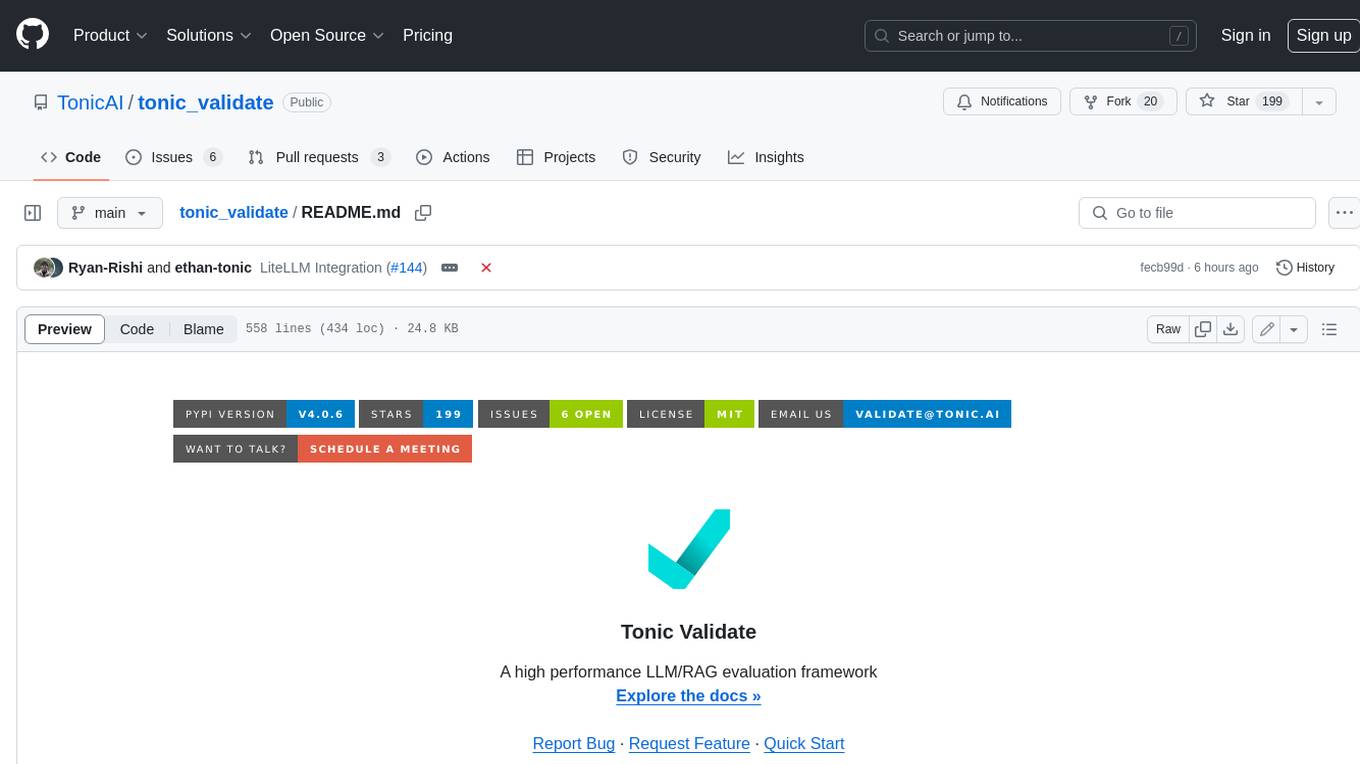
tonic_validate
Tonic Validate is a framework for the evaluation of LLM outputs, such as Retrieval Augmented Generation (RAG) pipelines. Validate makes it easy to evaluate, track, and monitor your LLM and RAG applications. Validate allows you to evaluate your LLM outputs through the use of our provided metrics which measure everything from answer correctness to LLM hallucination. Additionally, Validate has an optional UI to visualize your evaluation results for easy tracking and monitoring.
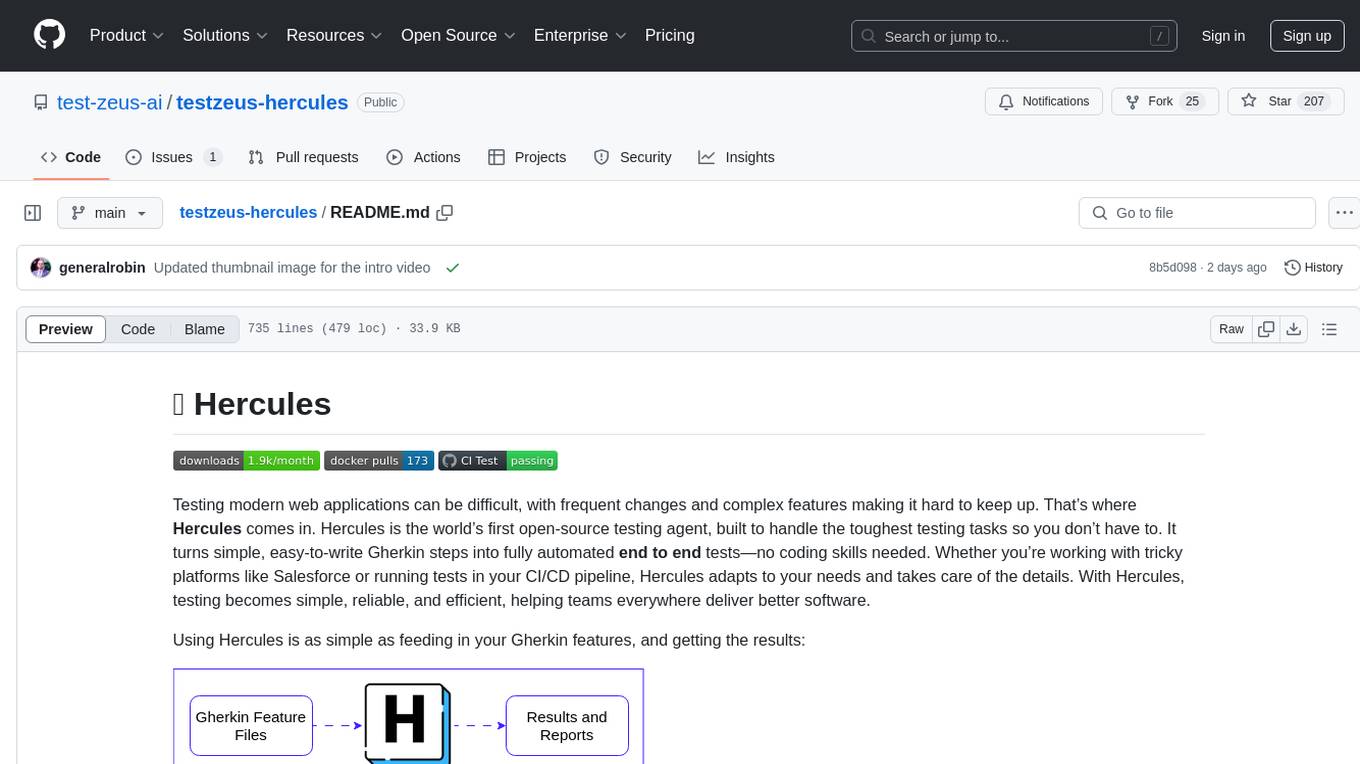
testzeus-hercules
Hercules is the world’s first open-source testing agent designed to handle the toughest testing tasks for modern web applications. It turns simple Gherkin steps into fully automated end-to-end tests, making testing simple, reliable, and efficient. Hercules adapts to various platforms like Salesforce and is suitable for CI/CD pipelines. It aims to democratize and disrupt test automation, making top-tier testing accessible to everyone. The tool is transparent, reliable, and community-driven, empowering teams to deliver better software. Hercules offers multiple ways to get started, including using PyPI package, Docker, or building and running from source code. It supports various AI models, provides detailed installation and usage instructions, and integrates with Nuclei for security testing and WCAG for accessibility testing. The tool is production-ready, open core, and open source, with plans for enhanced LLM support, advanced tooling, improved DOM distillation, community contributions, extensive documentation, and a bounty program.
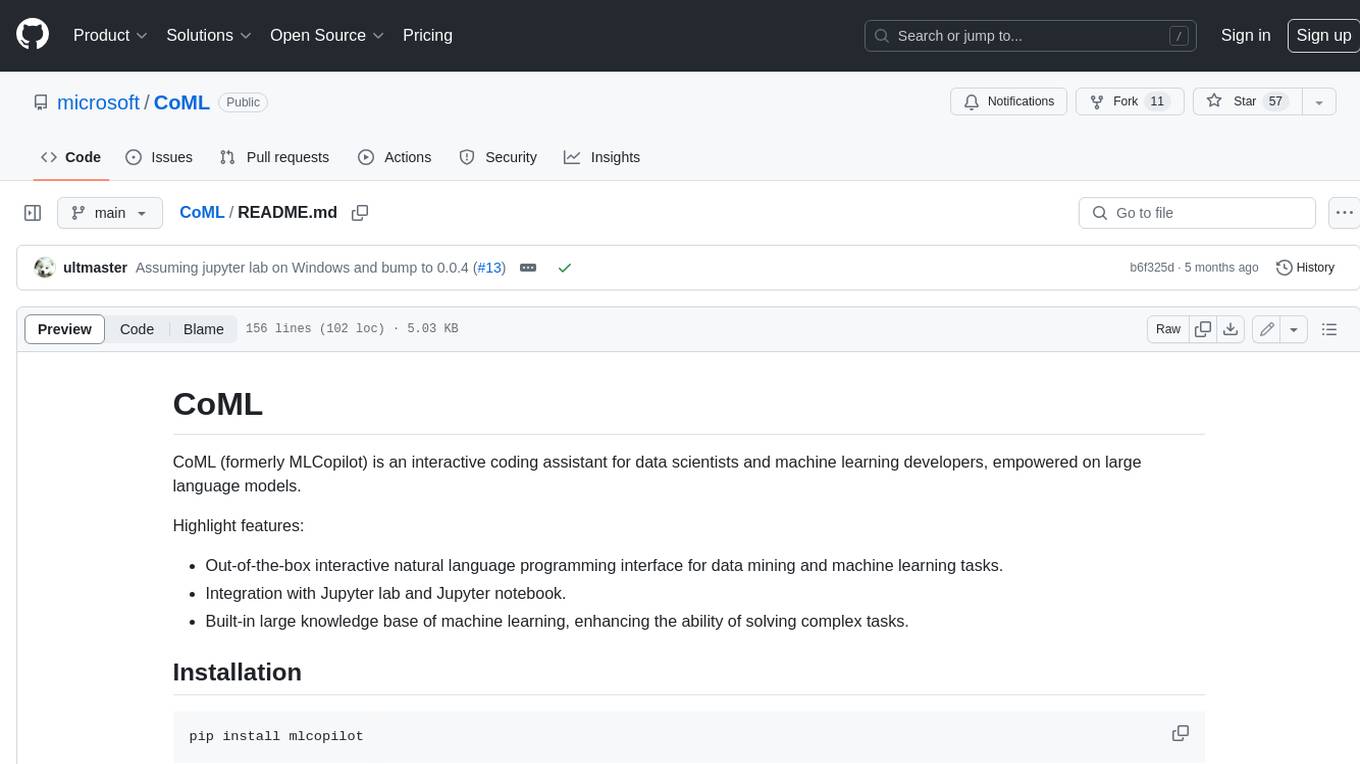
CoML
CoML (formerly MLCopilot) is an interactive coding assistant for data scientists and machine learning developers, empowered on large language models. It offers an out-of-the-box interactive natural language programming interface for data mining and machine learning tasks, integration with Jupyter lab and Jupyter notebook, and a built-in large knowledge base of machine learning to enhance the ability to solve complex tasks. The tool is designed to assist users in coding tasks related to data analysis and machine learning using natural language commands within Jupyter environments.
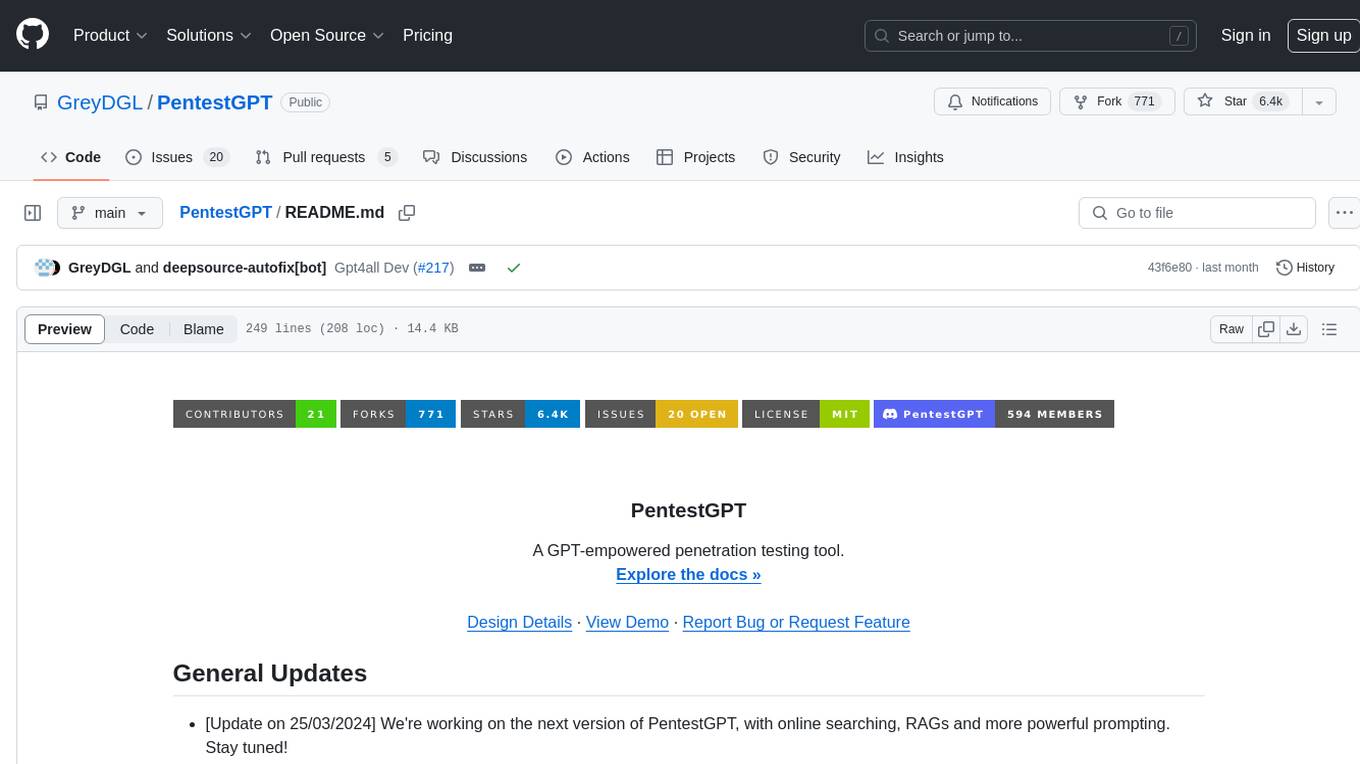
PentestGPT
PentestGPT is a penetration testing tool empowered by ChatGPT, designed to automate the penetration testing process. It operates interactively to guide penetration testers in overall progress and specific operations. The tool supports solving easy to medium HackTheBox machines and other CTF challenges. Users can use PentestGPT to perform tasks like testing connections, using different reasoning models, discussing with the tool, searching on Google, and generating reports. It also supports local LLMs with custom parsers for advanced users.
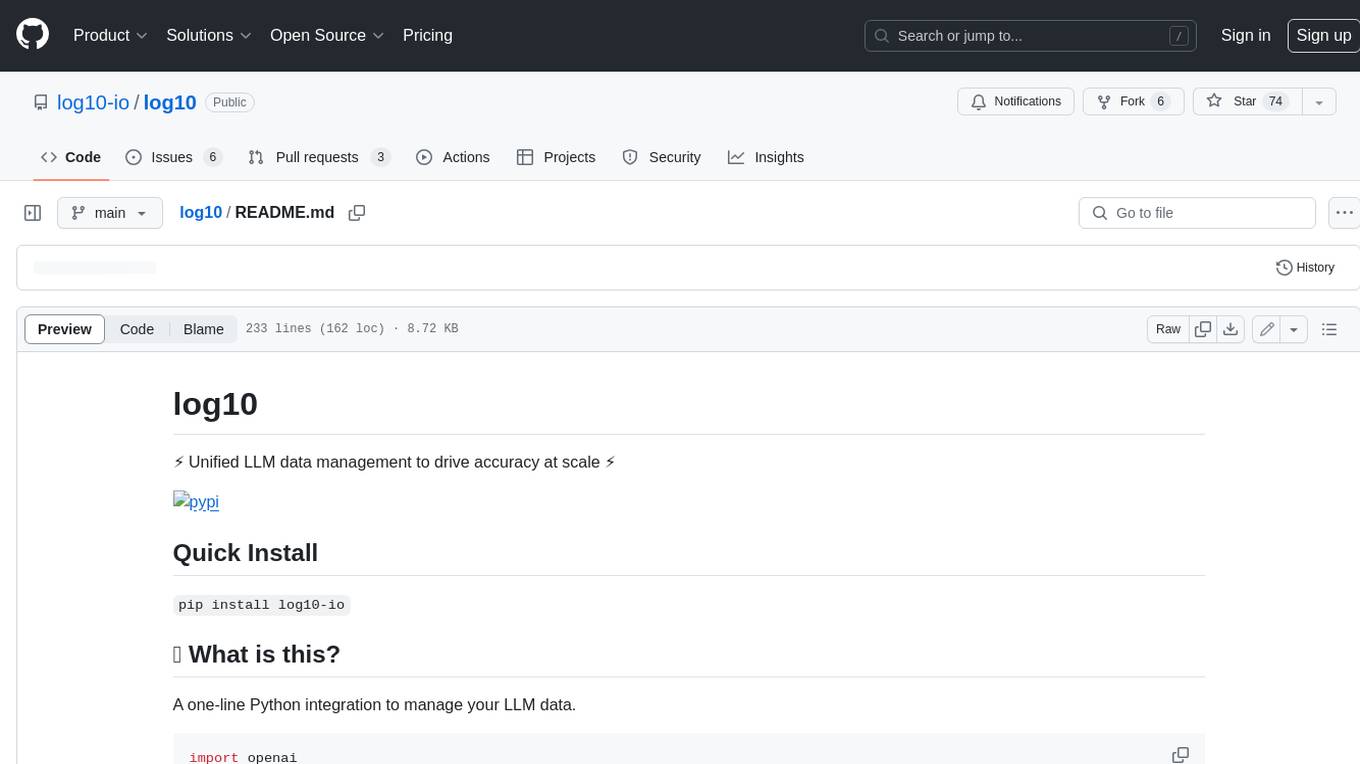
log10
Log10 is a one-line Python integration to manage your LLM data. It helps you log both closed and open-source LLM calls, compare and identify the best models and prompts, store feedback for fine-tuning, collect performance metrics such as latency and usage, and perform analytics and monitor compliance for LLM powered applications. Log10 offers various integration methods, including a python LLM library wrapper, the Log10 LLM abstraction, and callbacks, to facilitate its use in both existing production environments and new projects. Pick the one that works best for you. Log10 also provides a copilot that can help you with suggestions on how to optimize your prompt, and a feedback feature that allows you to add feedback to your completions. Additionally, Log10 provides prompt provenance, session tracking and call stack functionality to help debug prompt chains. With Log10, you can use your data and feedback from users to fine-tune custom models with RLHF, and build and deploy more reliable, accurate and efficient self-hosted models. Log10 also supports collaboration, allowing you to create flexible groups to share and collaborate over all of the above features.
For similar tasks

ChatData
ChatData is a robust chat-with-documents application designed to extract information and provide answers by querying the MyScale free knowledge base or uploaded documents. It leverages the Retrieval Augmented Generation (RAG) framework, millions of Wikipedia pages, and arXiv papers. Features include self-querying retriever, VectorSQL, session management, and building a personalized knowledge base. Users can effortlessly navigate vast data, explore academic papers, and research documents. ChatData empowers researchers, students, and knowledge enthusiasts to unlock the true potential of information retrieval.
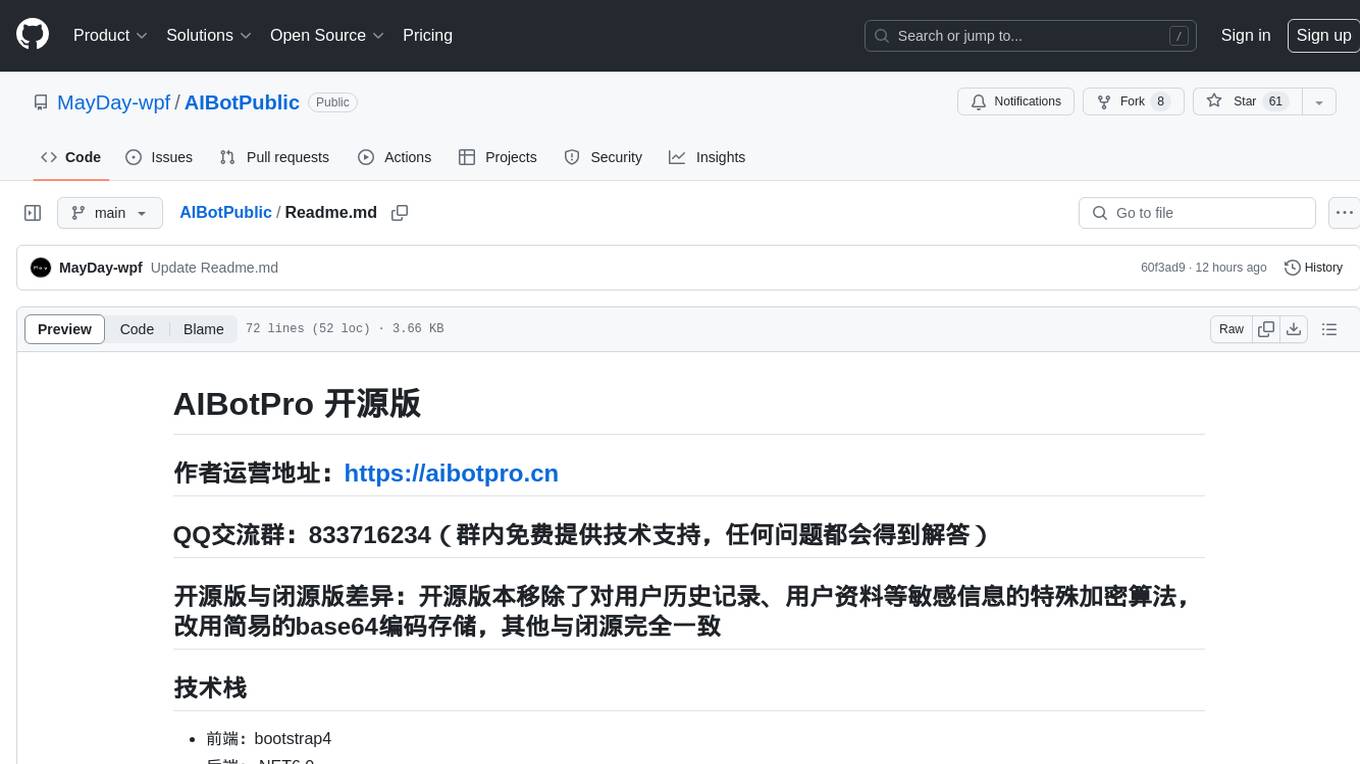
AIBotPublic
AIBotPublic is an open-source version of AIBotPro, a comprehensive AI tool that provides various features such as knowledge base construction, AI drawing, API hosting, and more. It supports custom plugins and parallel processing of multiple files. The tool is built using bootstrap4 for the frontend, .NET6.0 for the backend, and utilizes technologies like SqlServer, Redis, and Milvus for database and vector database functionalities. It integrates third-party dependencies like Baidu AI OCR, Milvus C# SDK, Google Search, and more to enhance its capabilities.
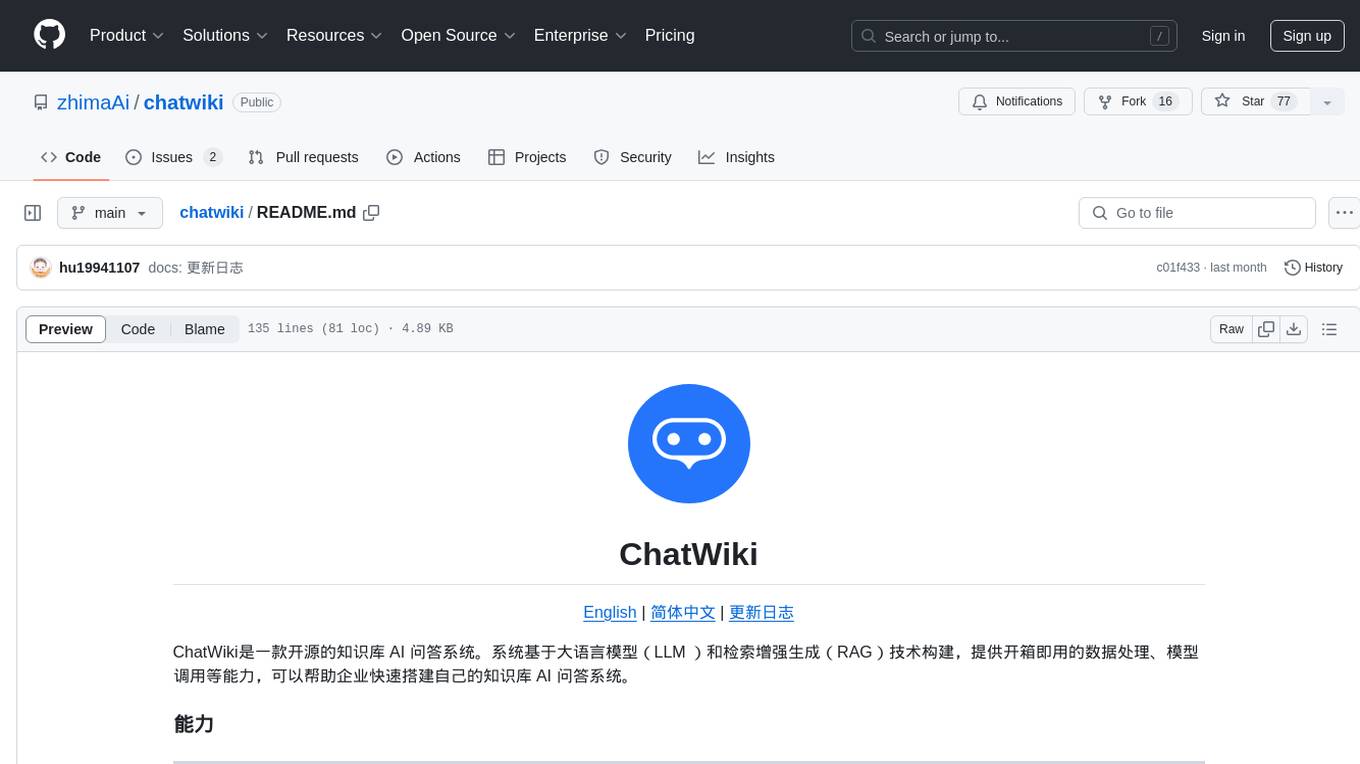
chatwiki
ChatWiki is an open-source knowledge base AI question-answering system. It is built on large language models (LLM) and retrieval-augmented generation (RAG) technologies, providing out-of-the-box data processing, model invocation capabilities, and helping enterprises quickly build their own knowledge base AI question-answering systems. It offers exclusive AI question-answering system, easy integration of models, data preprocessing, simple user interface design, and adaptability to different business scenarios.
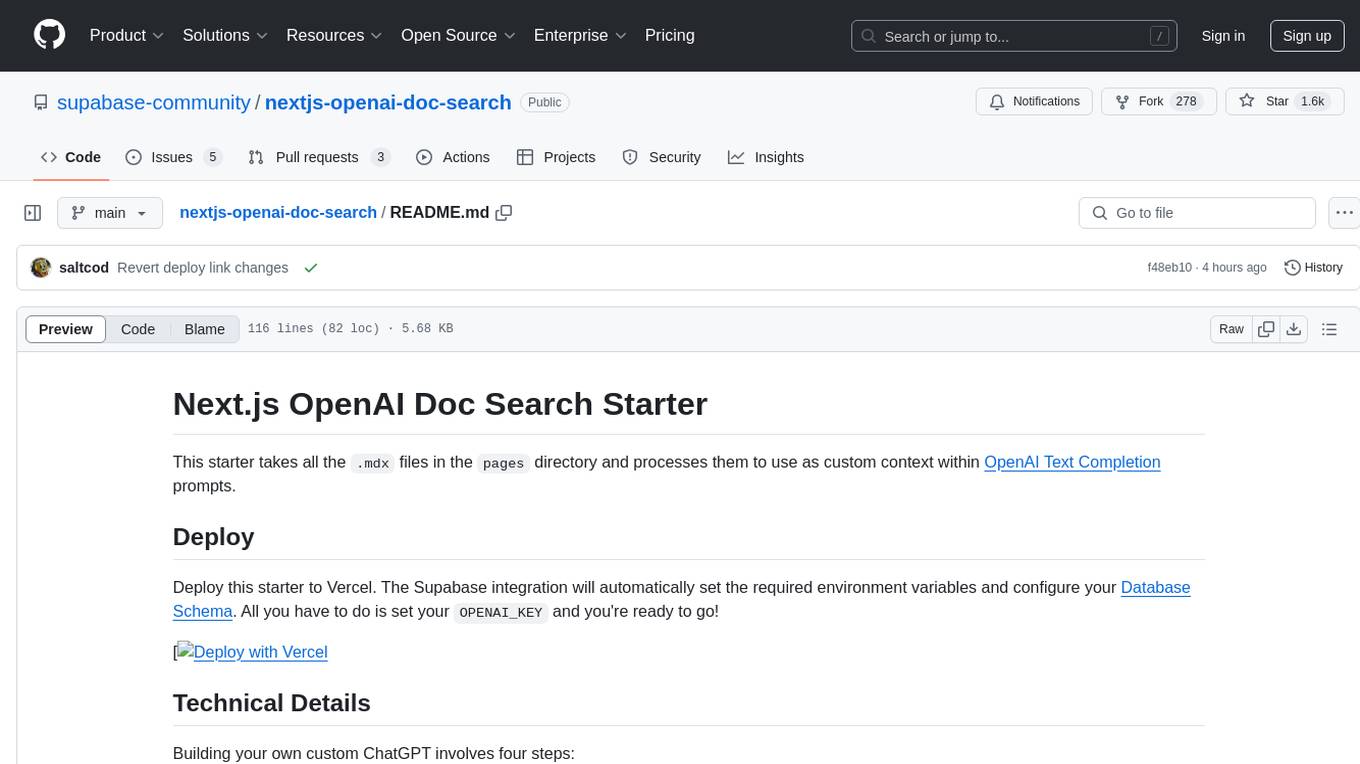
nextjs-openai-doc-search
This starter project is designed to process `.mdx` files in the `pages` directory to use as custom context within OpenAI Text Completion prompts. It involves building a custom ChatGPT style doc search powered by Next.js, OpenAI, and Supabase. The project includes steps for pre-processing knowledge base, storing embeddings in Postgres, performing vector similarity search, and injecting content into OpenAI GPT-3 text completion prompt.
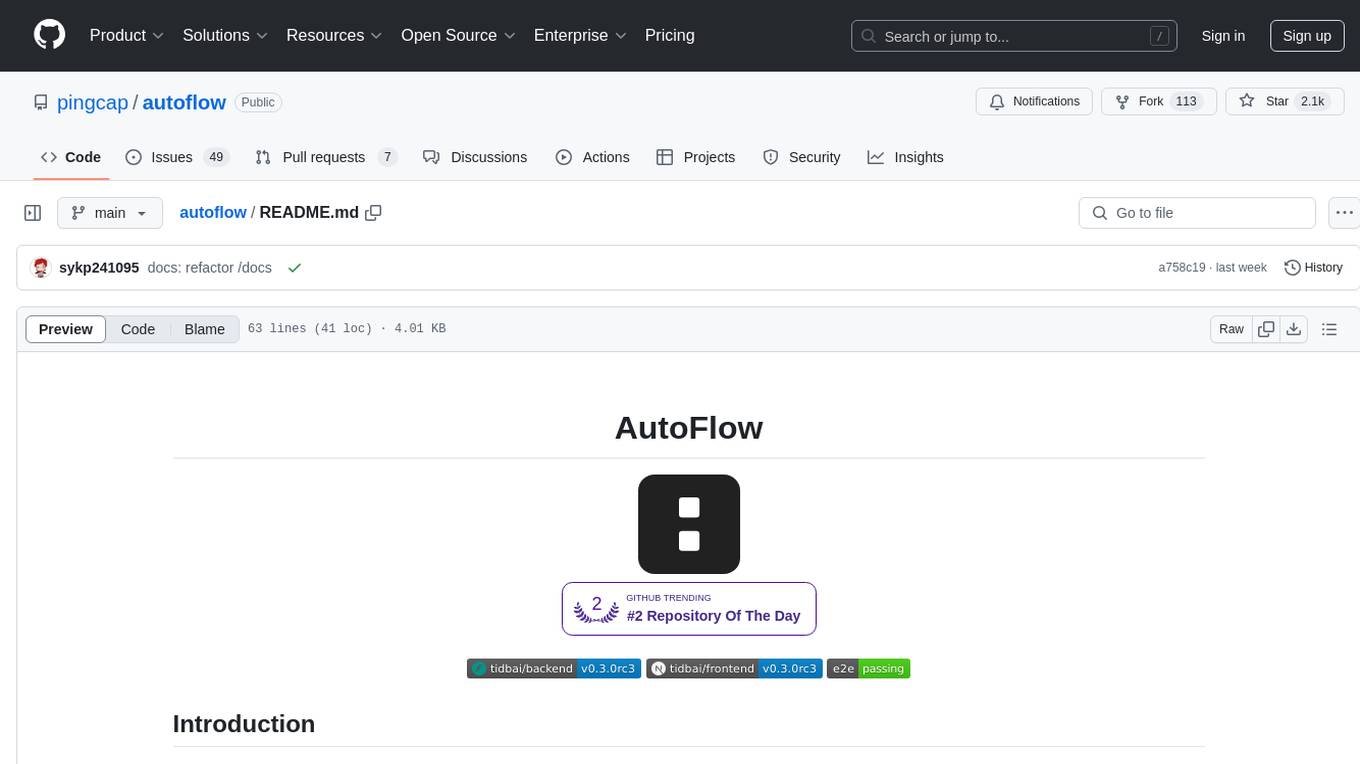
autoflow
AutoFlow is an open source graph rag based knowledge base tool built on top of TiDB Vector and LlamaIndex and DSPy. It features a Perplexity-style Conversational Search page and an Embeddable JavaScript Snippet for easy integration into websites. The tool allows for comprehensive coverage and streamlined search processes through sitemap URL scraping.
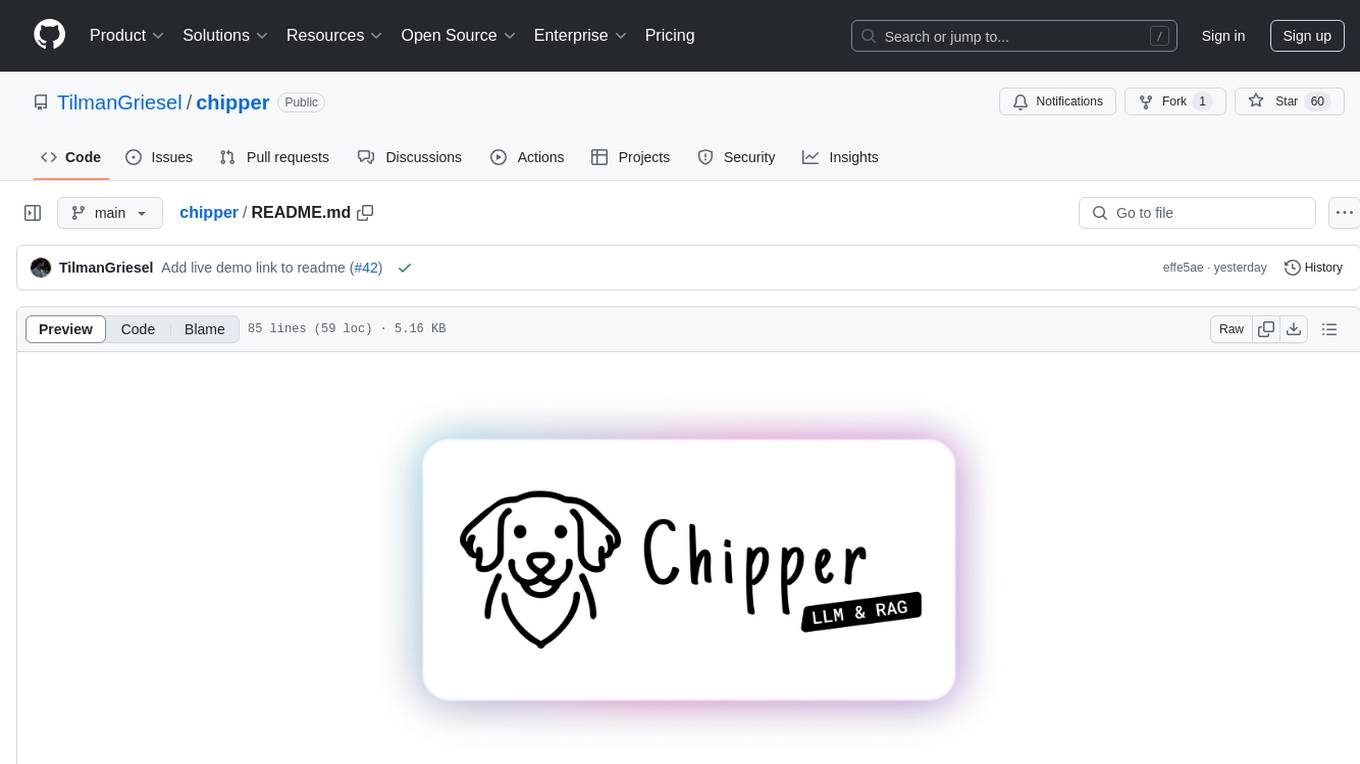
chipper
Chipper provides a web interface, CLI, and architecture for pipelines, document chunking, web scraping, and query workflows. It is built with Haystack, Ollama, Hugging Face, Docker, Tailwind, and ElasticSearch, running locally or as a Dockerized service. Originally created to assist in creative writing, it now offers features like local Ollama and Hugging Face API, ElasticSearch embeddings, document splitting, web scraping, audio transcription, user-friendly CLI, and Docker deployment. The project aims to be educational, beginner-friendly, and a playground for AI exploration and innovation.
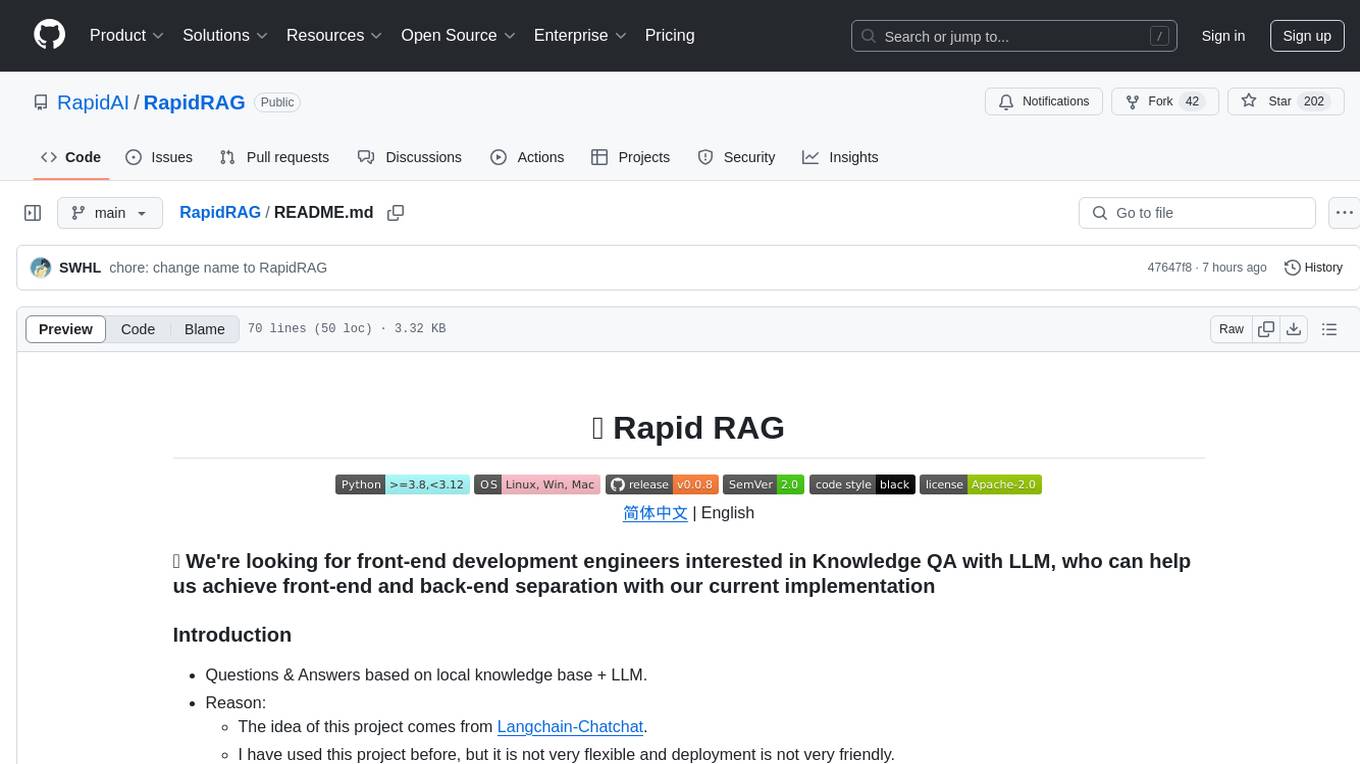
RapidRAG
RapidRAG is a project focused on Knowledge QA with LLM, combining Questions & Answers based on local knowledge base with a large language model. The project aims to provide a flexible and deployment-friendly solution for building a knowledge question answering system. It is modularized, allowing easy replacement of parts and simple code understanding. The tool supports various document formats and can utilize CPU for most parts, with the large language model interface requiring separate deployment.
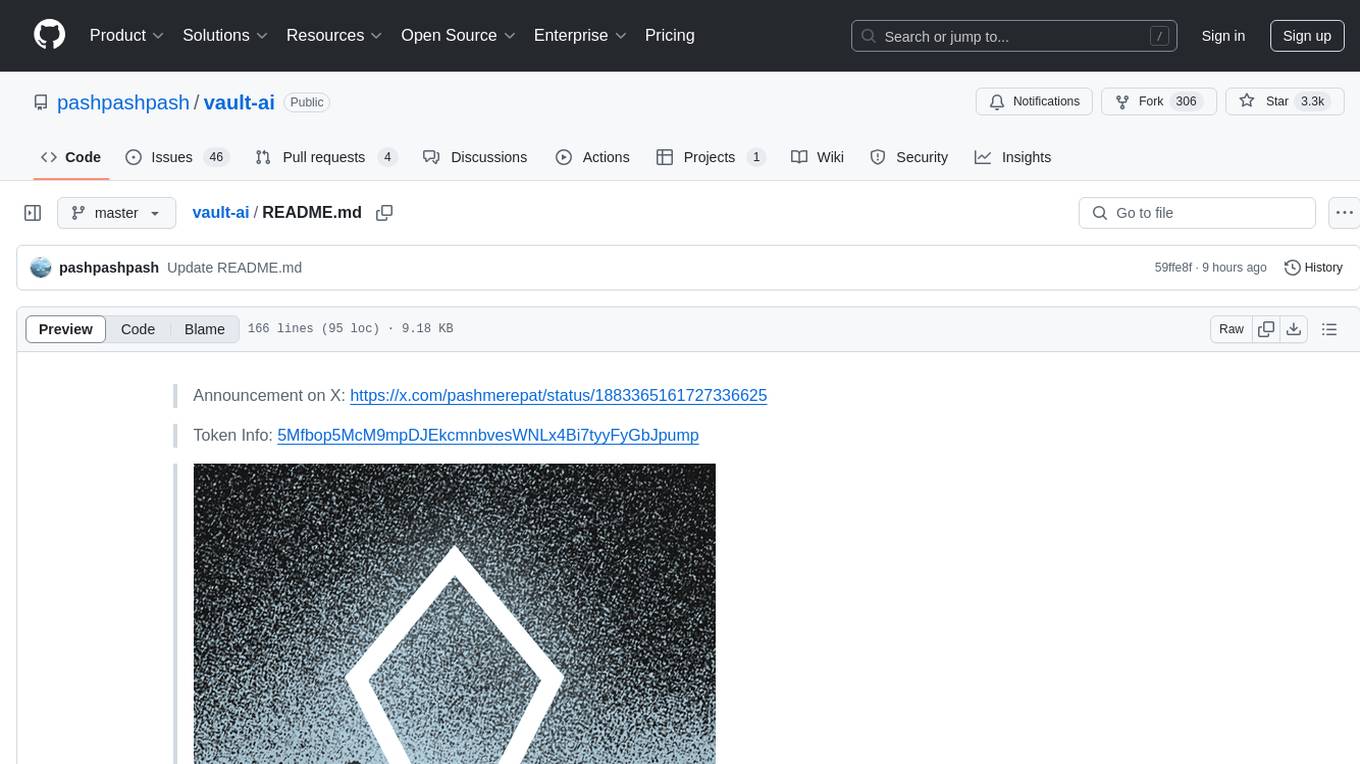
vault-ai
OP Vault is a tool that leverages the OP Stack (OpenAI + Pinecone Vector Database) to allow users to upload custom knowledgebase files and ask questions about their contents. It provides a user-friendly Golang server and React frontend for querying human-readable content like books and documents, making it valuable for knowledge extraction and question-answering. Users can upload entire libraries, receive specific answers with file and section references, and explore the power of the OP Stack in a practical interface.
For similar jobs
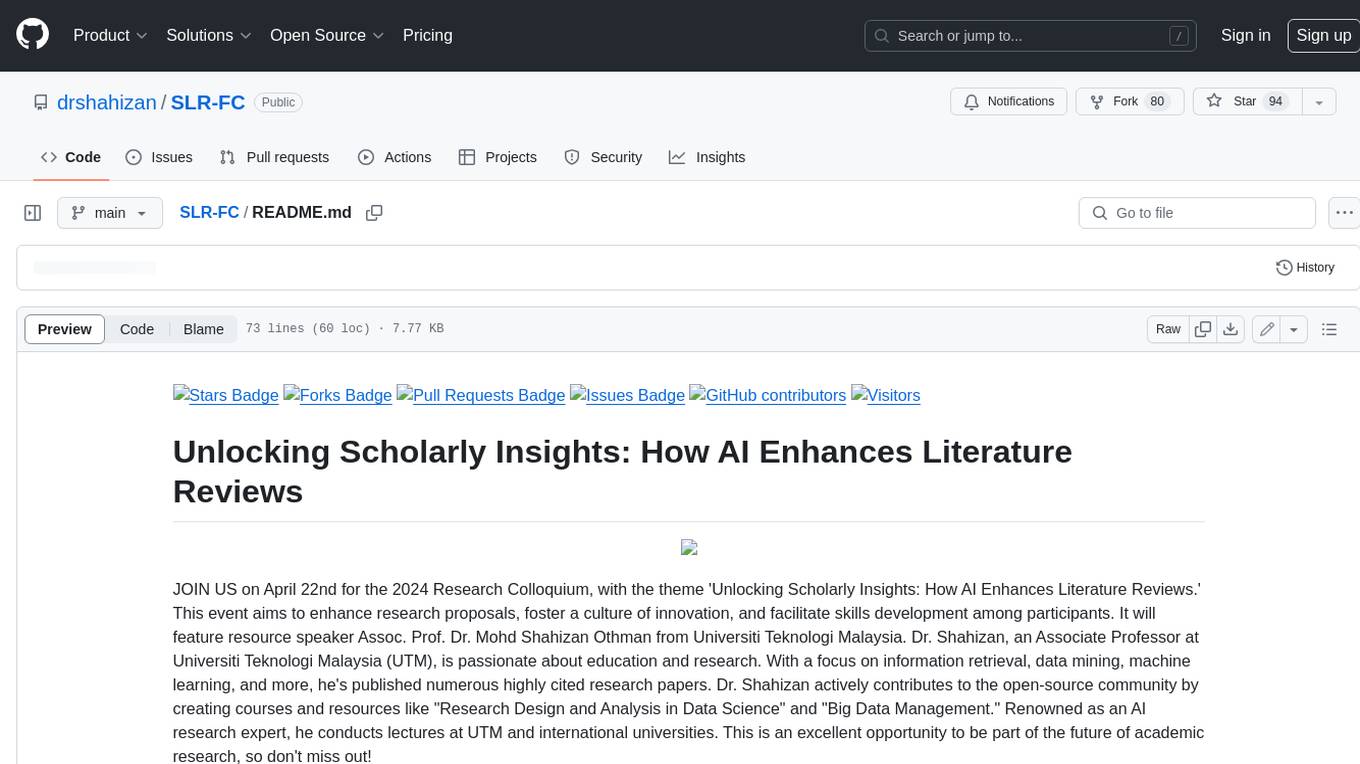
SLR-FC
This repository provides a comprehensive collection of AI tools and resources to enhance literature reviews. It includes a curated list of AI tools for various tasks, such as identifying research gaps, discovering relevant papers, visualizing paper content, and summarizing text. Additionally, the repository offers materials on generative AI, effective prompts, copywriting, image creation, and showcases of AI capabilities. By leveraging these tools and resources, researchers can streamline their literature review process, gain deeper insights from scholarly literature, and improve the quality of their research outputs.
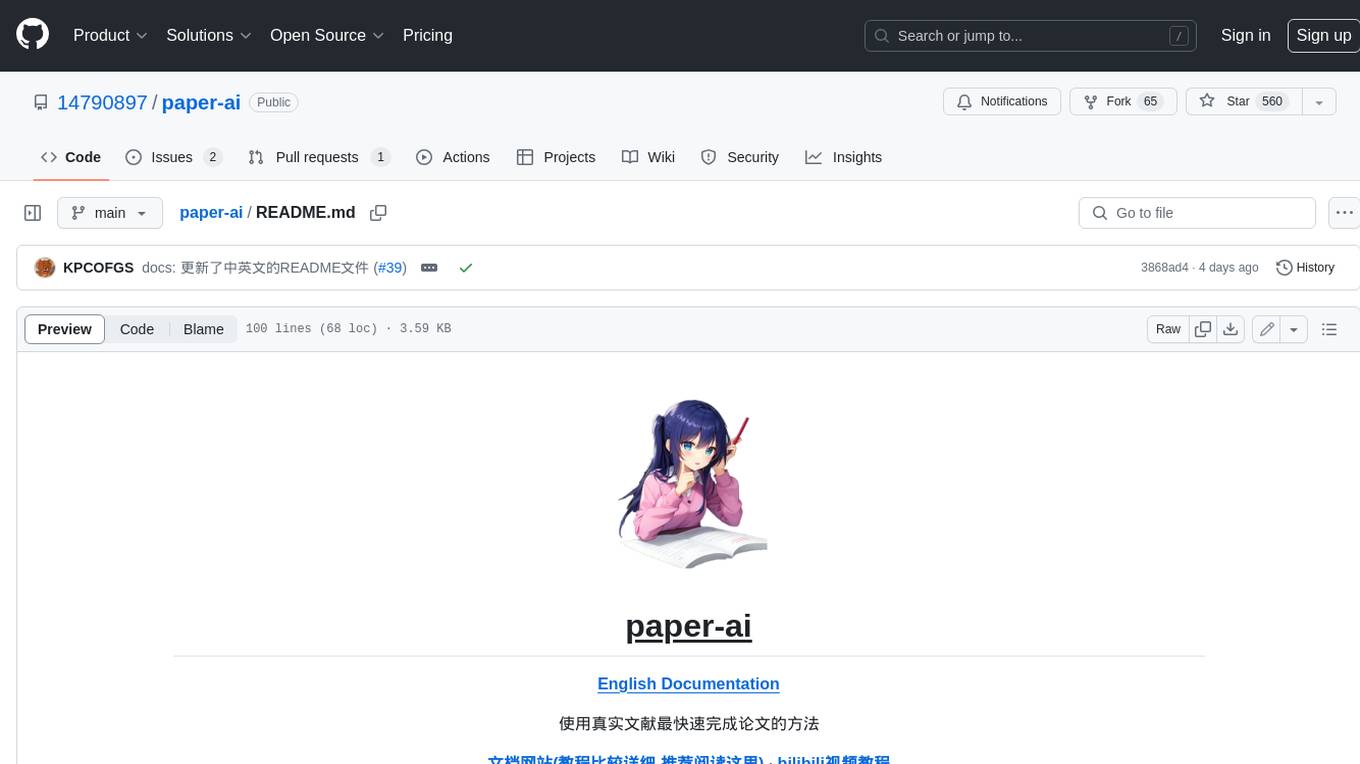
paper-ai
Paper-ai is a tool that helps you write papers using artificial intelligence. It provides features such as AI writing assistance, reference searching, and editing and formatting tools. With Paper-ai, you can quickly and easily create high-quality papers.
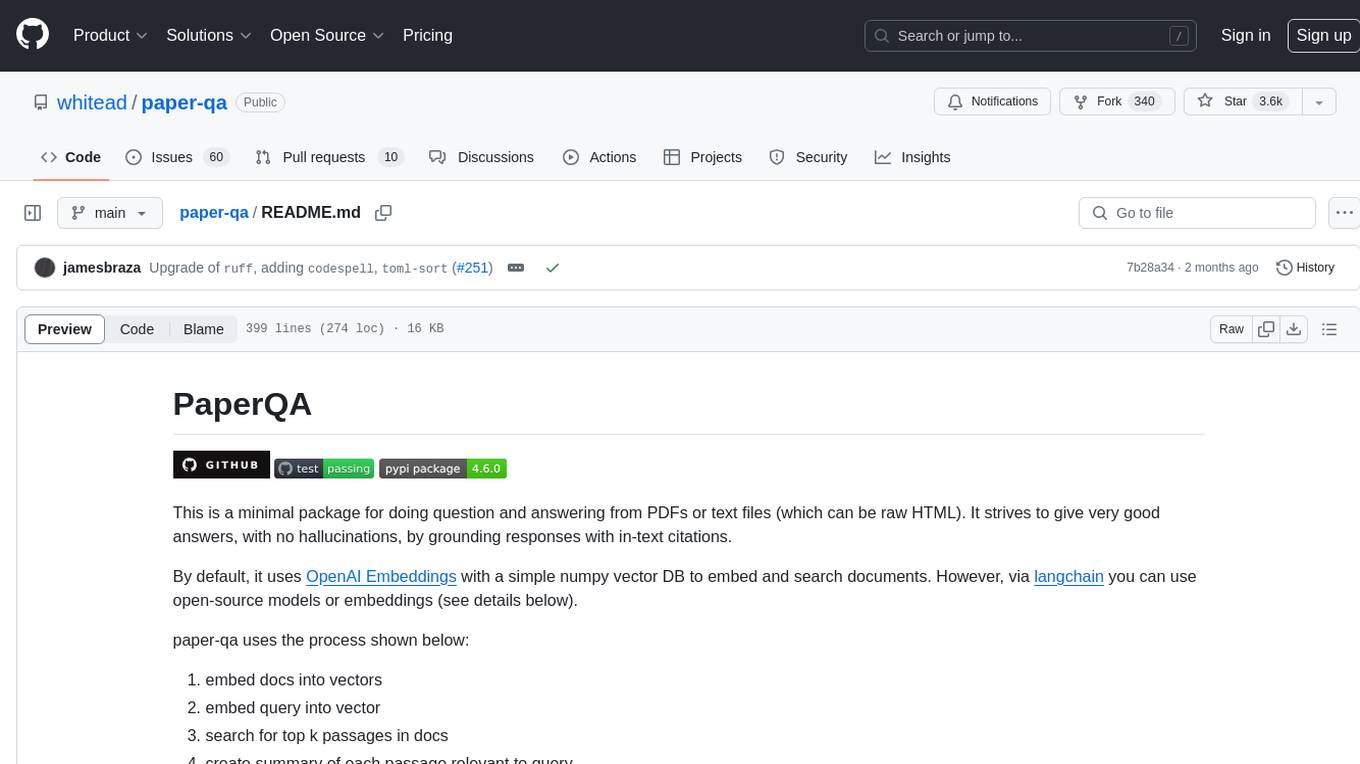
paper-qa
PaperQA is a minimal package for question and answering from PDFs or text files, providing very good answers with in-text citations. It uses OpenAI Embeddings to embed and search documents, and follows a process of embedding docs and queries, searching for top passages, creating summaries, scoring and selecting relevant summaries, putting summaries into prompt, and generating answers. Users can customize prompts and use various models for embeddings and LLMs. The tool can be used asynchronously and supports adding documents from paths, files, or URLs.

ChatData
ChatData is a robust chat-with-documents application designed to extract information and provide answers by querying the MyScale free knowledge base or uploaded documents. It leverages the Retrieval Augmented Generation (RAG) framework, millions of Wikipedia pages, and arXiv papers. Features include self-querying retriever, VectorSQL, session management, and building a personalized knowledge base. Users can effortlessly navigate vast data, explore academic papers, and research documents. ChatData empowers researchers, students, and knowledge enthusiasts to unlock the true potential of information retrieval.
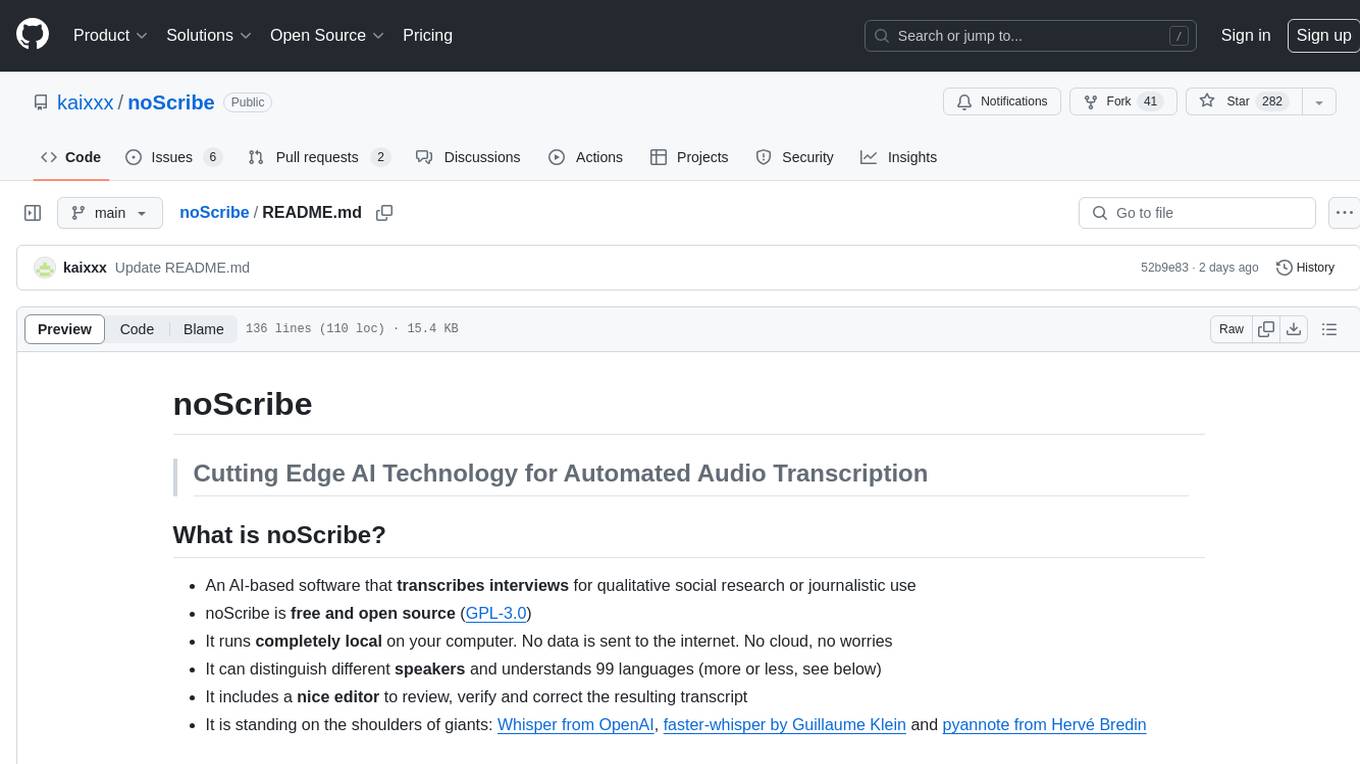
noScribe
noScribe is an AI-based software designed for automated audio transcription, specifically tailored for transcribing interviews for qualitative social research or journalistic purposes. It is a free and open-source tool that runs locally on the user's computer, ensuring data privacy. The software can differentiate between speakers and supports transcription in 99 languages. It includes a user-friendly editor for reviewing and correcting transcripts. Developed by Kai Dröge, a PhD in sociology with a background in computer science, noScribe aims to streamline the transcription process and enhance the efficiency of qualitative analysis.
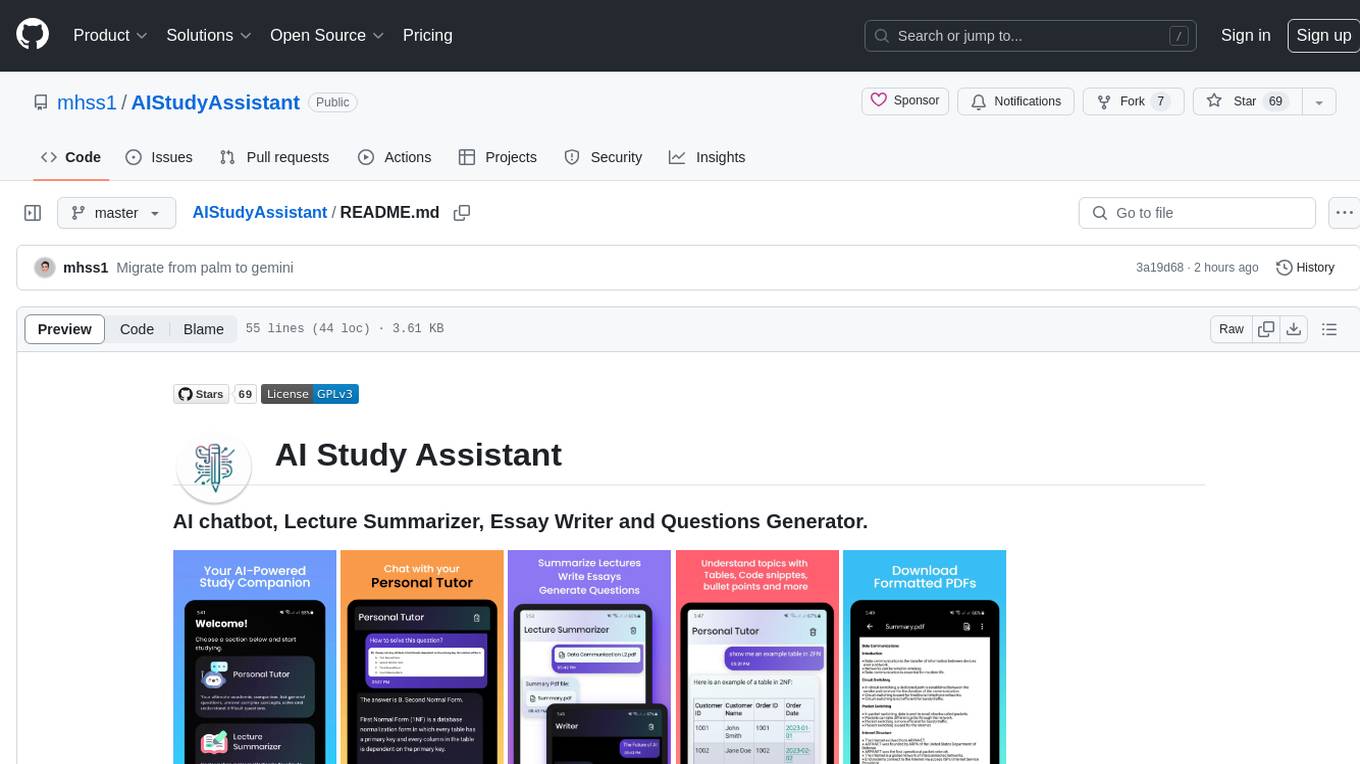
AIStudyAssistant
AI Study Assistant is an app designed to enhance learning experience and boost academic performance. It serves as a personal tutor, lecture summarizer, writer, and question generator powered by Google PaLM 2. Features include interacting with an AI chatbot, summarizing lectures, generating essays, and creating practice questions. The app is built using 100% Kotlin, Jetpack Compose, Clean Architecture, and MVVM design pattern, with technologies like Ktor, Room DB, Hilt, and Kotlin coroutines. AI Study Assistant aims to provide comprehensive AI-powered assistance for students in various academic tasks.
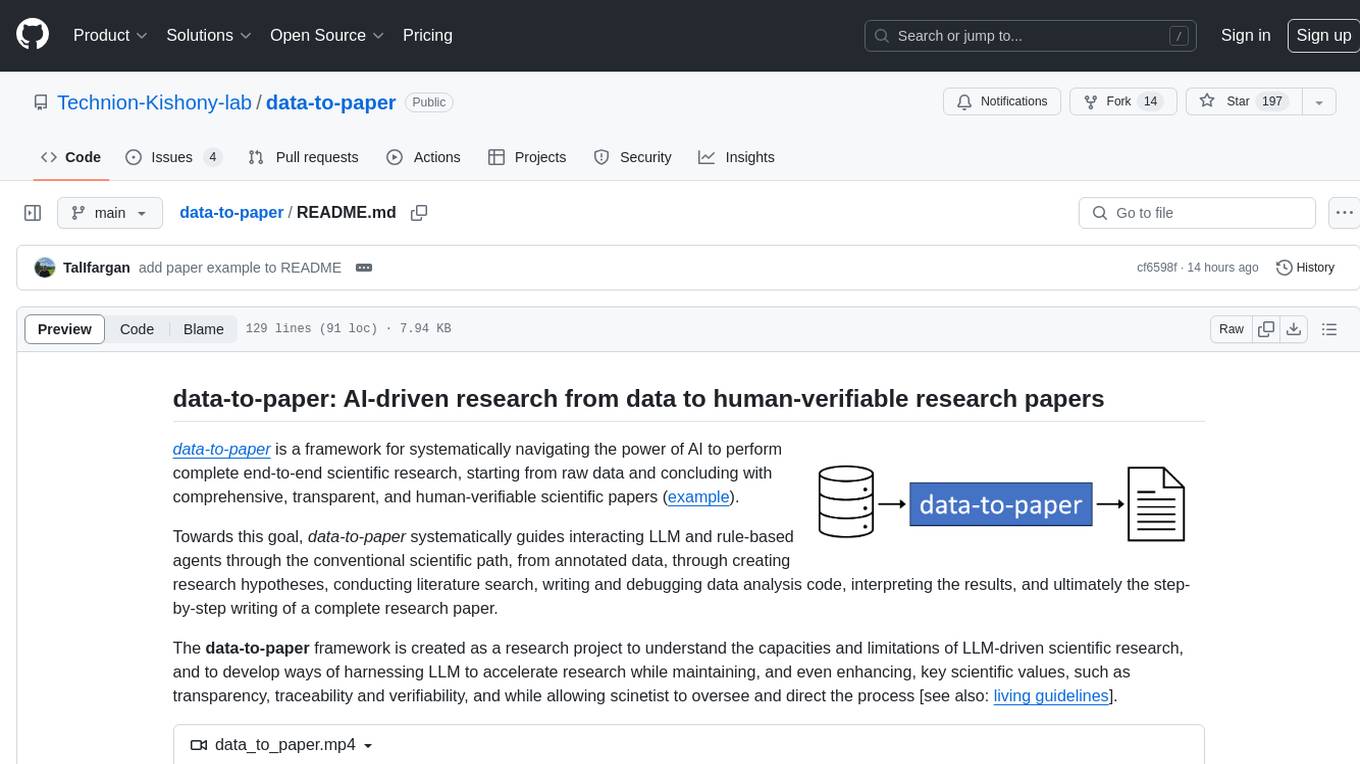
data-to-paper
Data-to-paper is an AI-driven framework designed to guide users through the process of conducting end-to-end scientific research, starting from raw data to the creation of comprehensive and human-verifiable research papers. The framework leverages a combination of LLM and rule-based agents to assist in tasks such as hypothesis generation, literature search, data analysis, result interpretation, and paper writing. It aims to accelerate research while maintaining key scientific values like transparency, traceability, and verifiability. The framework is field-agnostic, supports both open-goal and fixed-goal research, creates data-chained manuscripts, involves human-in-the-loop interaction, and allows for transparent replay of the research process.
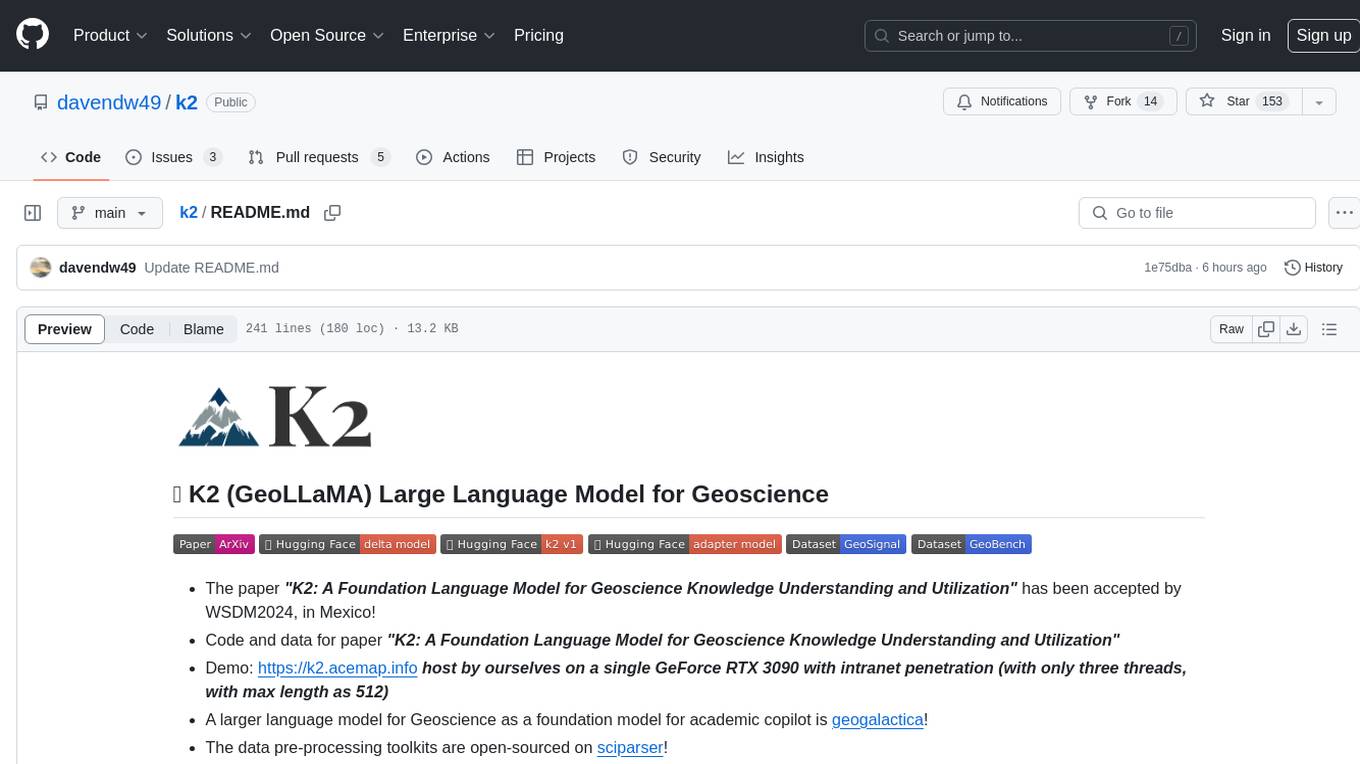
k2
K2 (GeoLLaMA) is a large language model for geoscience, trained on geoscience literature and fine-tuned with knowledge-intensive instruction data. It outperforms baseline models on objective and subjective tasks. The repository provides K2 weights, core data of GeoSignal, GeoBench benchmark, and code for further pretraining and instruction tuning. The model is available on Hugging Face for use. The project aims to create larger and more powerful geoscience language models in the future.



